The Victor Pinchuk Foundation reveals the winners of its 2014 Future Generation Art Prize
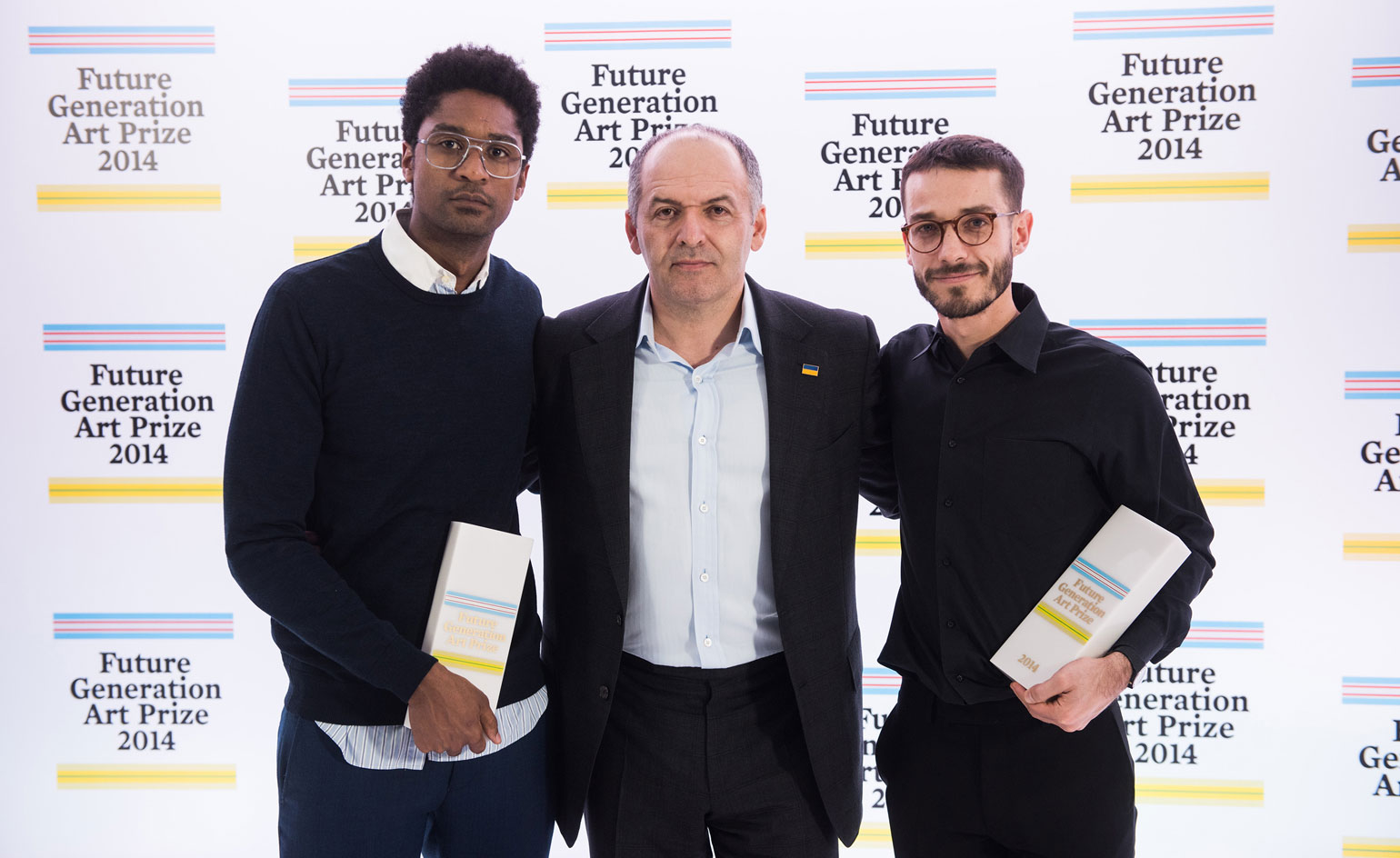
Despite the chilly -9°C early winter freeze in Kiev there was a consistent queue of trendy young people waiting eagerly outside the Pinchuk Art Centre throughout the weekend to see the Future Generation Art Prize exhibition. Given recent events in Ukraine, there’s more interest than ever in the Victor Pinchuk Foundation’s biennial art prize, both locally and internationally.
Now in its third year, the $100,000 prize awarded by billionaire philanthropist Victor Pinchuk is the most generous international art award open for application to all artists under 35; it’s also attracted high profile judges in previous years, Nicholas Serota and Ai Weiwei included – little wonder the Foundation received 5,586 applications from 148 countries this year.
An international committee whittled that tally down to a 21-strong shortlist with, for the first time, two artists from the Ukraine. Meanwhile, China, the UK, and the US were also well represented with two artists each. In his award speech Pinchuk emphasized the importance of providing a platform for voices of discontent in a political crisis. 'Art is linked to freedom and openness,' he said.
When we asked him if he thought Ukrainian artists had been silenced or crippled by revolution and political crisis this year, Pinchuk shook his head. 'Artists respond faster and deeper than the rest of the world.' Pinchuk Art Centre curator Bjorn Geldhof said that the revolution which took place in February 'unites almost all the works in the show, whether it be in a direct or indirect way.'
Chilean artist Pilar Quinteros reconstructed a vanished fountain at Maidan - the site in Kiev of the main protest camp in February - out of paper, before asking people to destroy it; and collective performance art group Public Movement led a crowd symbolically through the city’s snow-laden streets, using dance, music and theatre to provoke cycles of friendship and strife among dozens of participants in major sites of in the city.
In the end the main prize was shared between Angolan installation artist Nástio Mosquito, now based in Ghent, and New-York based Colombian artist Carlos Motta. The panel of judges, including sculptor Doris Salcedo and curator Eckhard Schneider, awarded three Special Prizes (including a $20,000 residency programme) to two Ukrainian artists and a Russian artist. They insisted the decision was not politically motivated, and that the prize was judged purely on quality. 'That was a gift from God,' commented Pinchuk.
We spoke with both of the winning artists to find out more. Carlos Motta tells us about the the historical and cultural prejudices that fuel his artistic practice...
Wallpaper*: Your sculpture ‘Instrument’, a penis hand-carved in obsidian stone in a glass vitrine in the middle of the floor, is the first artwork one sees in this year’s Future Generation exhibition. Is it a challenge?
Carlos Motta: We still live a deeply homophobic world. It’s deeply engrained even in places where one thinks the law has put things in place. The situation in Ukraine is extreme - homosexuals and transsexuals are targets, literally. Yes, that’s something that needs to be challenged and tackled.
Almost all your work references historic objects and monuments from Colombian culture. Tell us about the homoerotic drawings of Aztec-style figurines.
CM: That work is about the ways in which pre-Hispanic objects were recontextualised under colonial rule. Eurocentric thinking and European epistemology was applied to specific objects that depicted same-sex relations. What those works meant back then we will never know because everything was erased, or made to be understood within the framework of religious and legal structures. I'm drawing on different sources to speak about that processes of erasure and reinterpretation form a specific perspective – a patriarchal, dominant perspective driven by morality and criminality.
This is your first time exhibiting in Ukraine. Did you specifically want to address the audience in Kiev?
CM: I made a new work called ‘The History of Homosexual Repression in Ukraine’. It consists of a city light outside the gallery, and a free publication for people take away. I’ve been working with a Ukrainian journalist, who helped research ways in which homosexuality has been repressed here. The publication lists 60 ways in which the body, homosexuality, and transsexualism have been criminalized, neglected, socially repressed, culturally segregated and so on, from the Middle Ages to today.
Fellow award winner Nástio Mosquito reflects on his audience and the importance of travel...
Wallpaper*: Your installation is complex. It features two films being simultaneously projected into opposite walls, with audience seating on either side. How do you know where to sit?
Nástio Mosquito: It’s easy for us as audiences to sit back and judge what we are experiencing. This was an attempt to avoid that, to provide an experience where you engage with the work. I want [to create] a sense of uncomfortableness because you’re watching something but at the same time you’re being seen. There’s constant interaction.
Have you noticed anything interesting while watching your audiences here in Kiev?
NM: Traveling is important. The possibility to travel, to interact with different human beings, keeps me satisfied with my main focus: the individual. My interest is in the individual and how the individual makes him/herself part of something. I want to be able to propose something to an individual understanding that that individual is part of something bigger.
The judges have praised works in the exhibition for challenging the status quo. When you installed, were you interested in what's been going on in Kiev?
NM: That’s not my problem. I’m not a slave to circumstance. I recognize that context is important, but the crucial thing is for me to express my perspective and hope that it’s useful for someone. I hope it’s useful for the Pinchuk Foundation, as I hope that it’s useful for Kiev society, as I hope that it’s useful for Bangladesh.
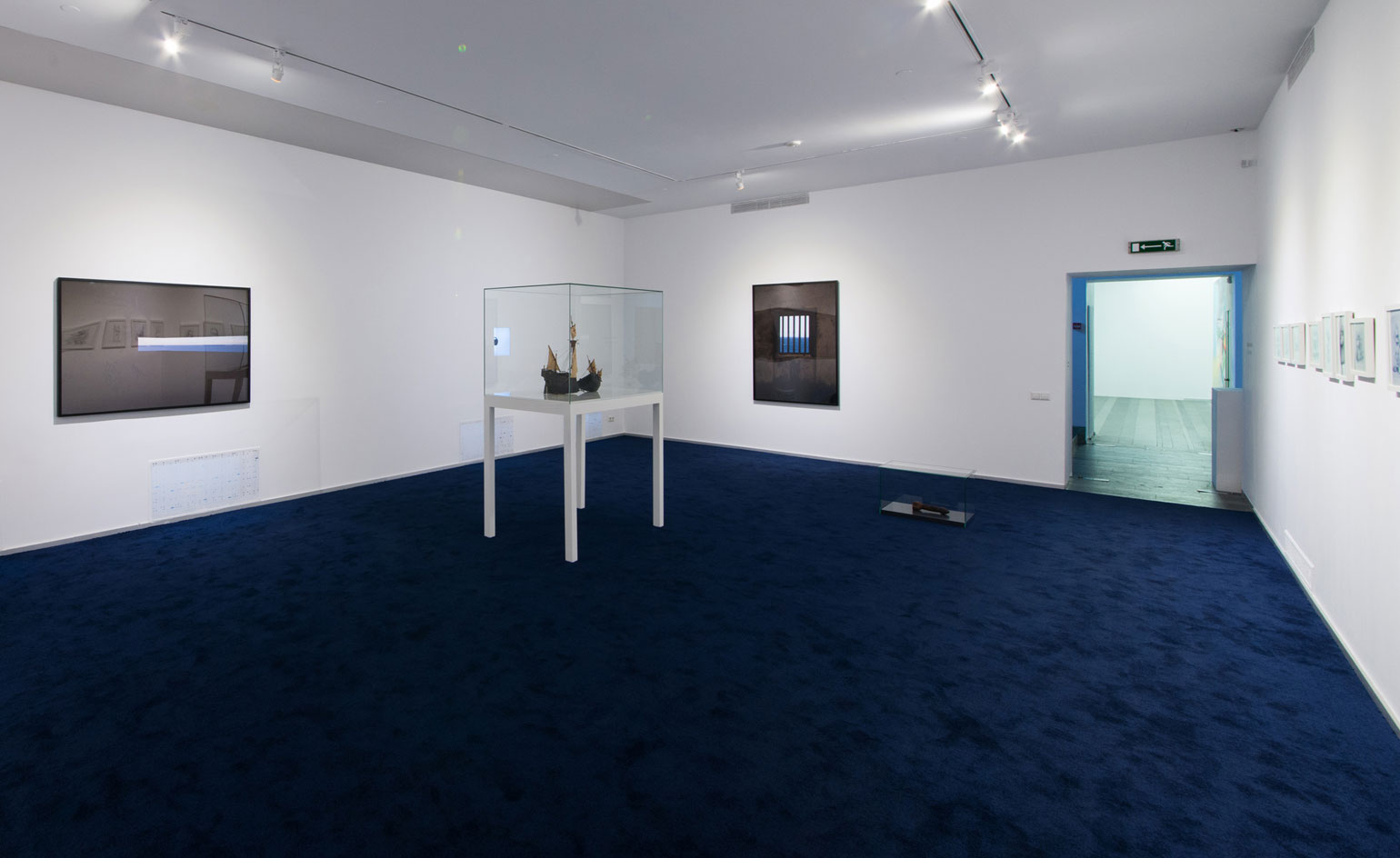
An international jury whittled the 5,586 entries down to a 21-strong shortlist. Pictured is an installation view of winner Motta's pieces at the Pinchuk Art Centre in Kiev, where the works of the shortlisted and winning artists are being exhibited until January 2015
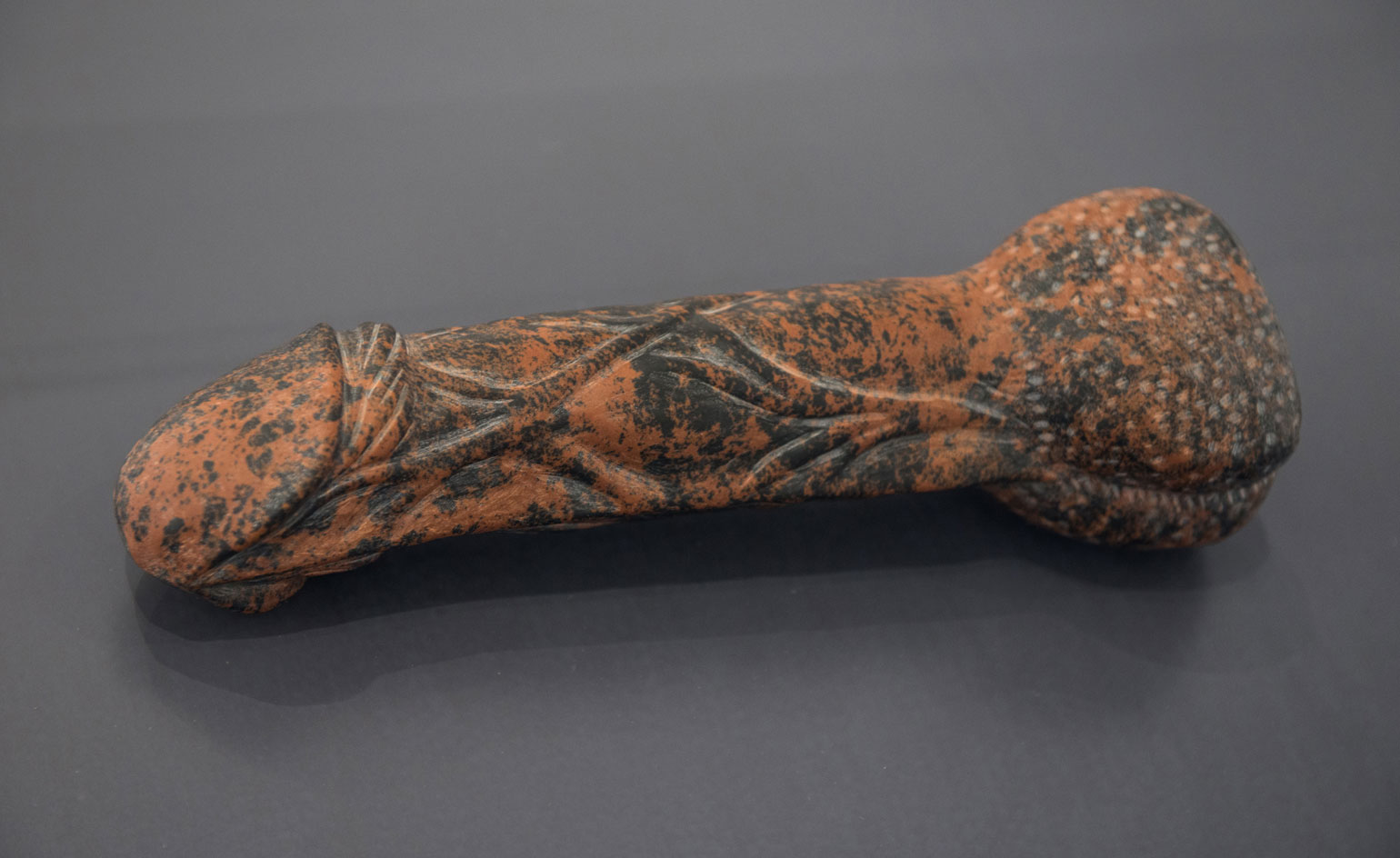
Motta's sculpture ‘Instrument’, a penis hand-carved in obsidian stone in a glass vitrine in the middle of the floor, is the confronting artwork one first sees upon entering this year’s Future Generation exhibition
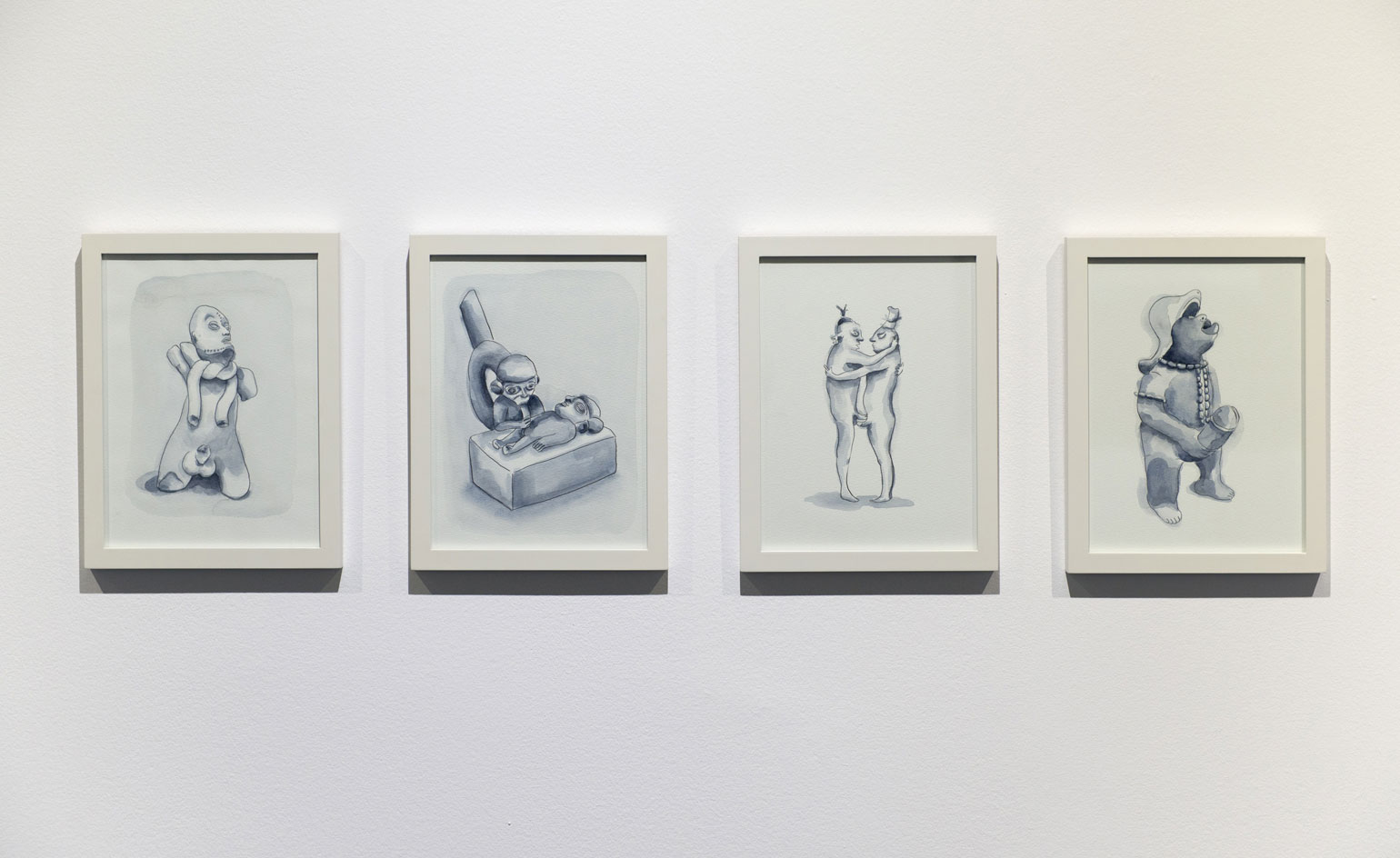
'Hacia una historiografía homoerótica (Towards Homoerotic Historiography), #1 – 13', by Carlos Motta, 2013. 'I have committed myself to talking about repressed sexual minorities,' said Motta. Various homoerotic works in his installation are present with the same dry, distanced manner as traditional historical artefacts
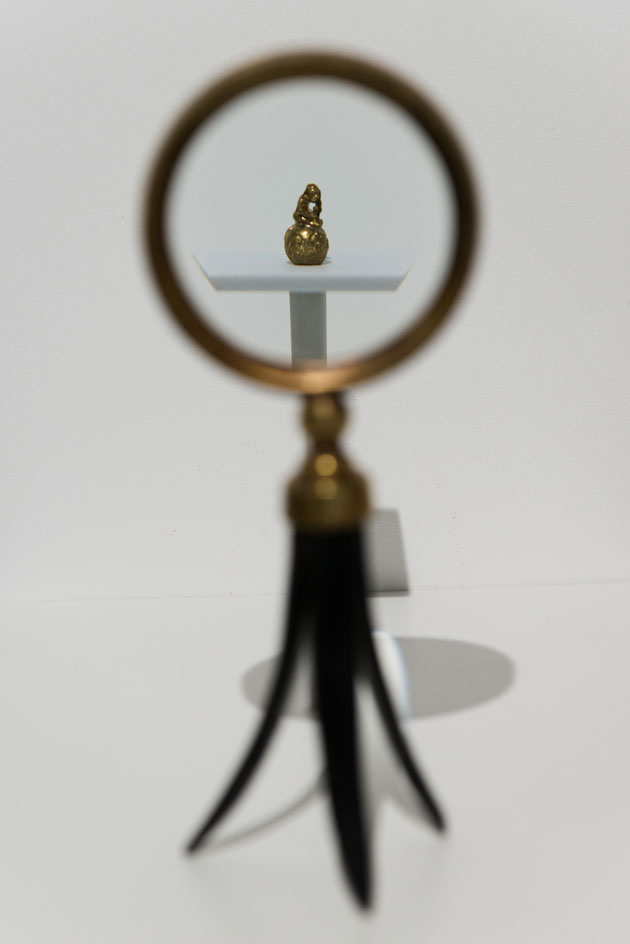
'Atlas', by Carlos Motta, 2013. Judges praised Motta's presentation style: 'Using the language of a historical museum display and fabricating cultural material, Motta constructs a context that allows him to take the pre-colonial heritage and colonial history of Latin America as a starting point for a deeply personal exploration'
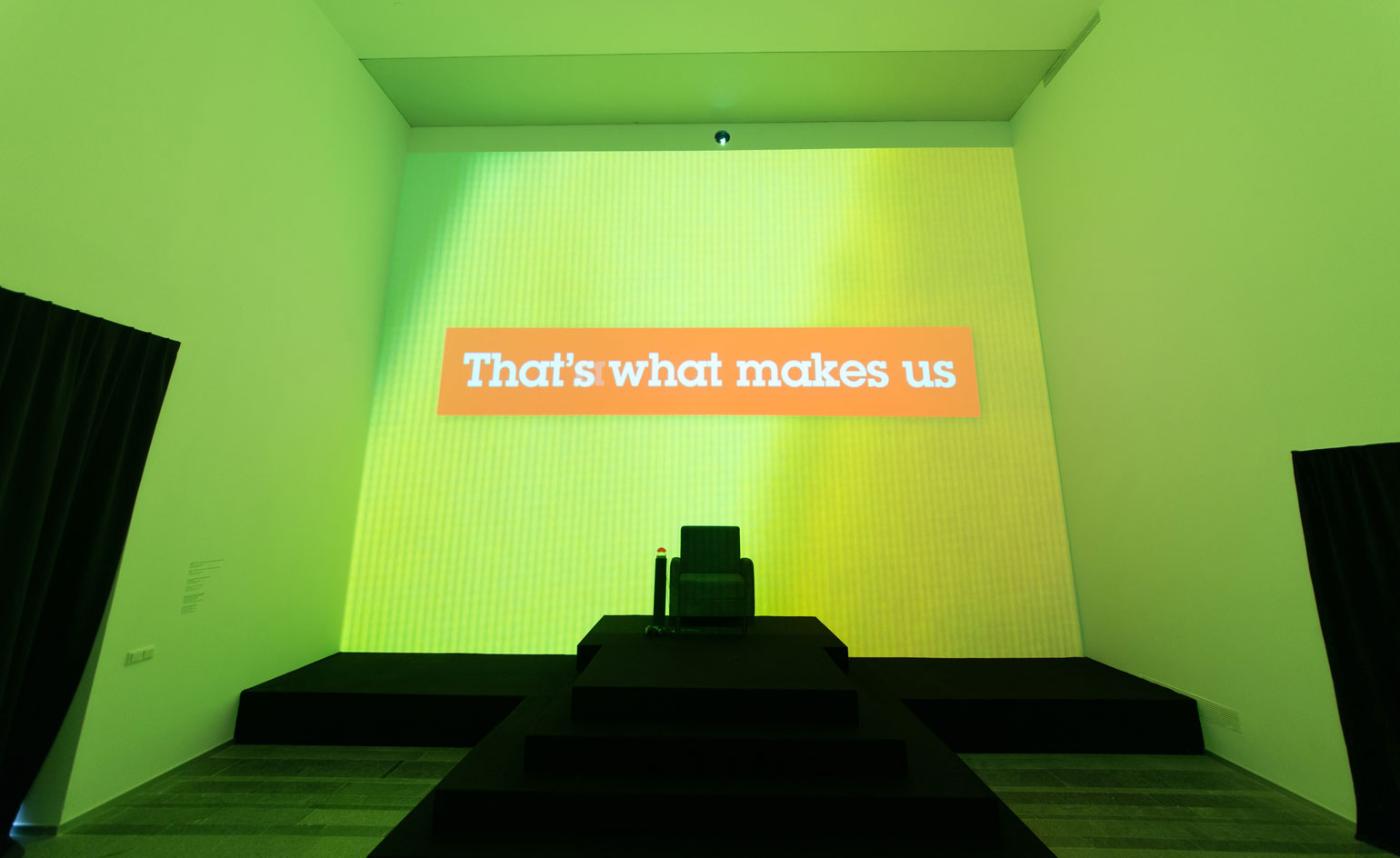
Installation view of 'Let Me Kiss Your Butt Cheek’, 2014), a video installation by joint prize winner Nástio Mosquito. The work features two films being simultaneously projected into opposite walls, with audience seating on either side
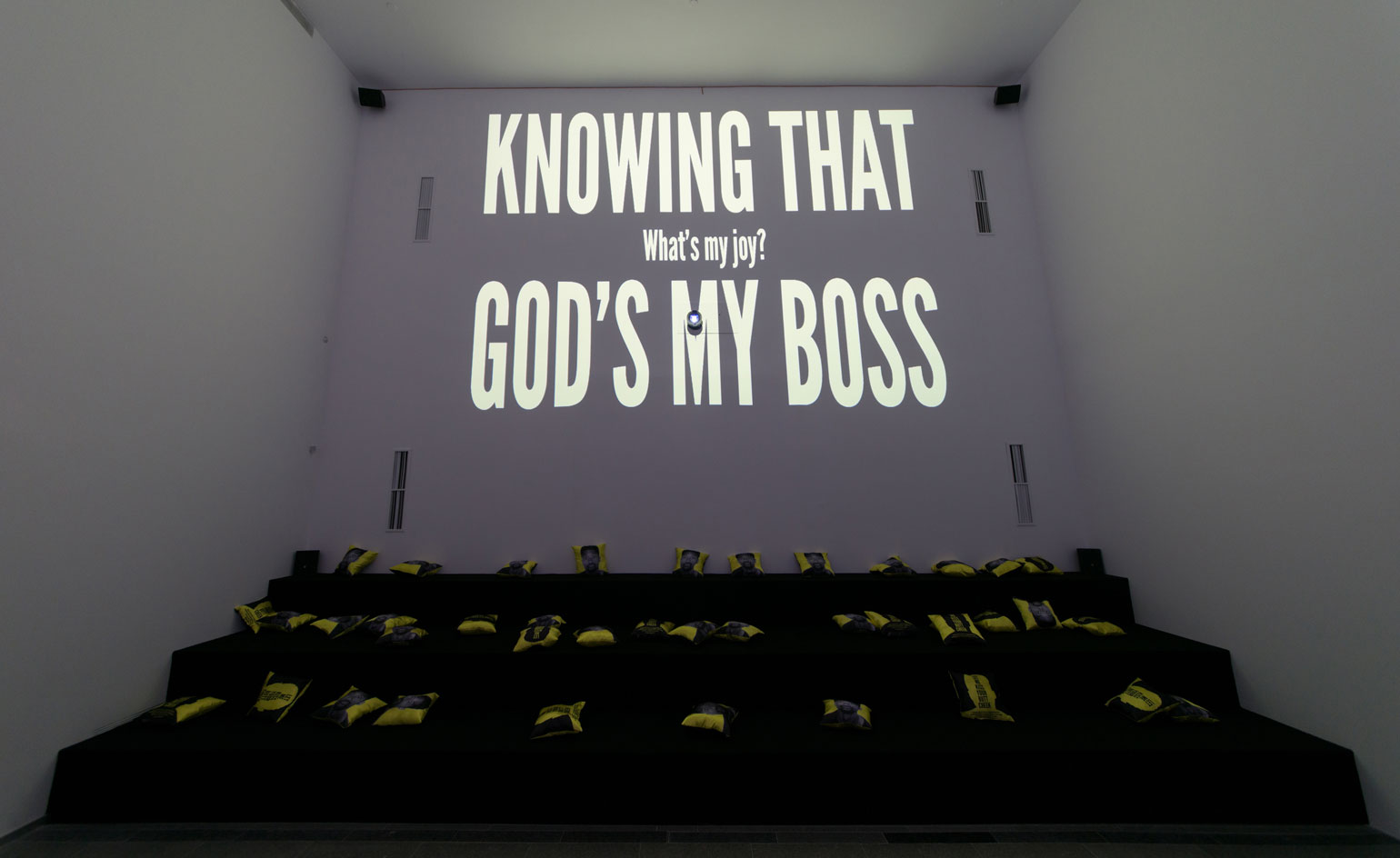
Says Mosquito, 'It’s easy for us as audiences to sit back and judge what we are experiencing. This was an attempt to avoid that, to provide an experience where you engage with the work'
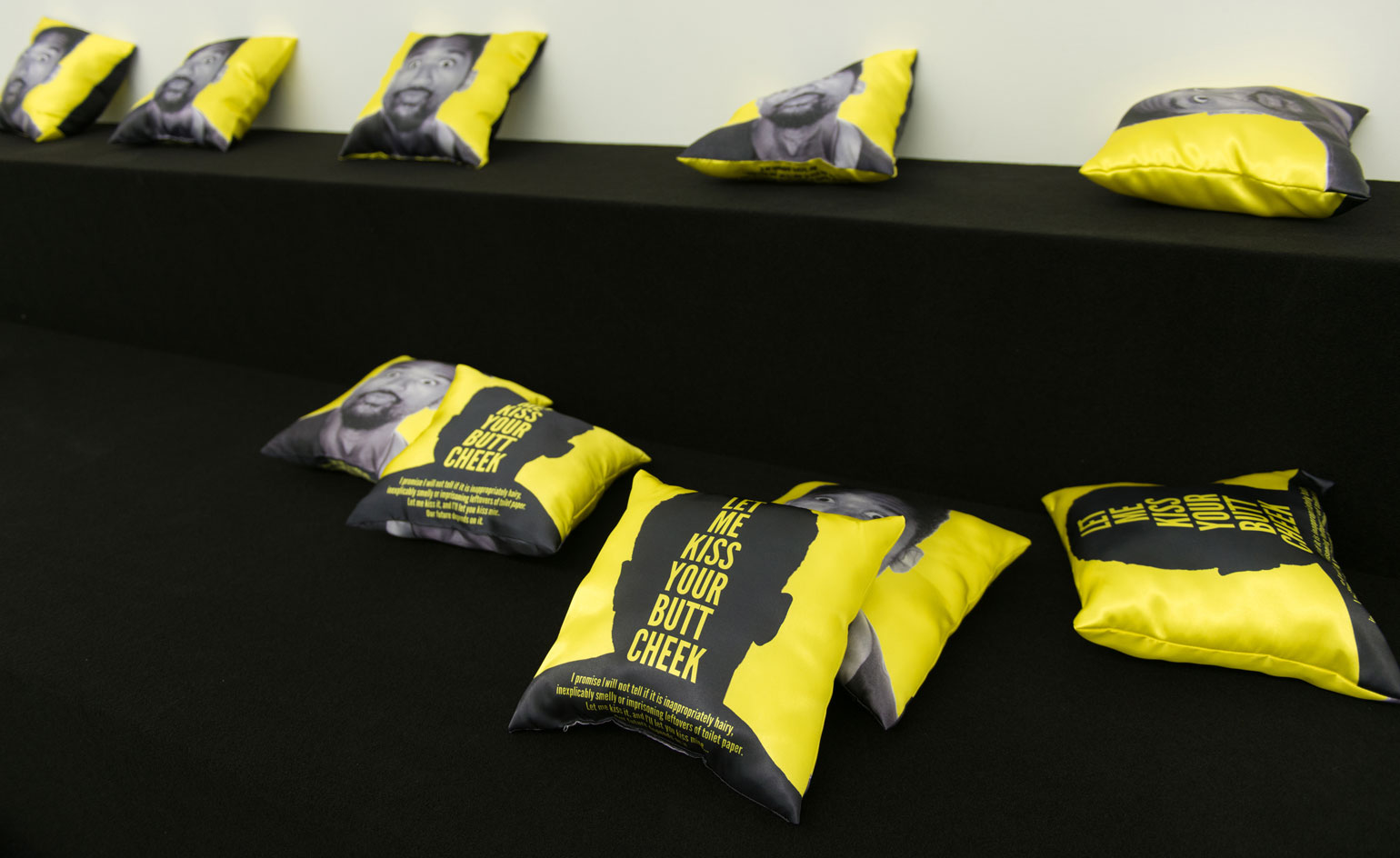
Judges described his works as 'complex vignettes that evoke a long tradition of spoken word poetry and musical improvisation, [through which] he brings an alternative dimension to the way we experience art, as well as the fraught realities of our global society'
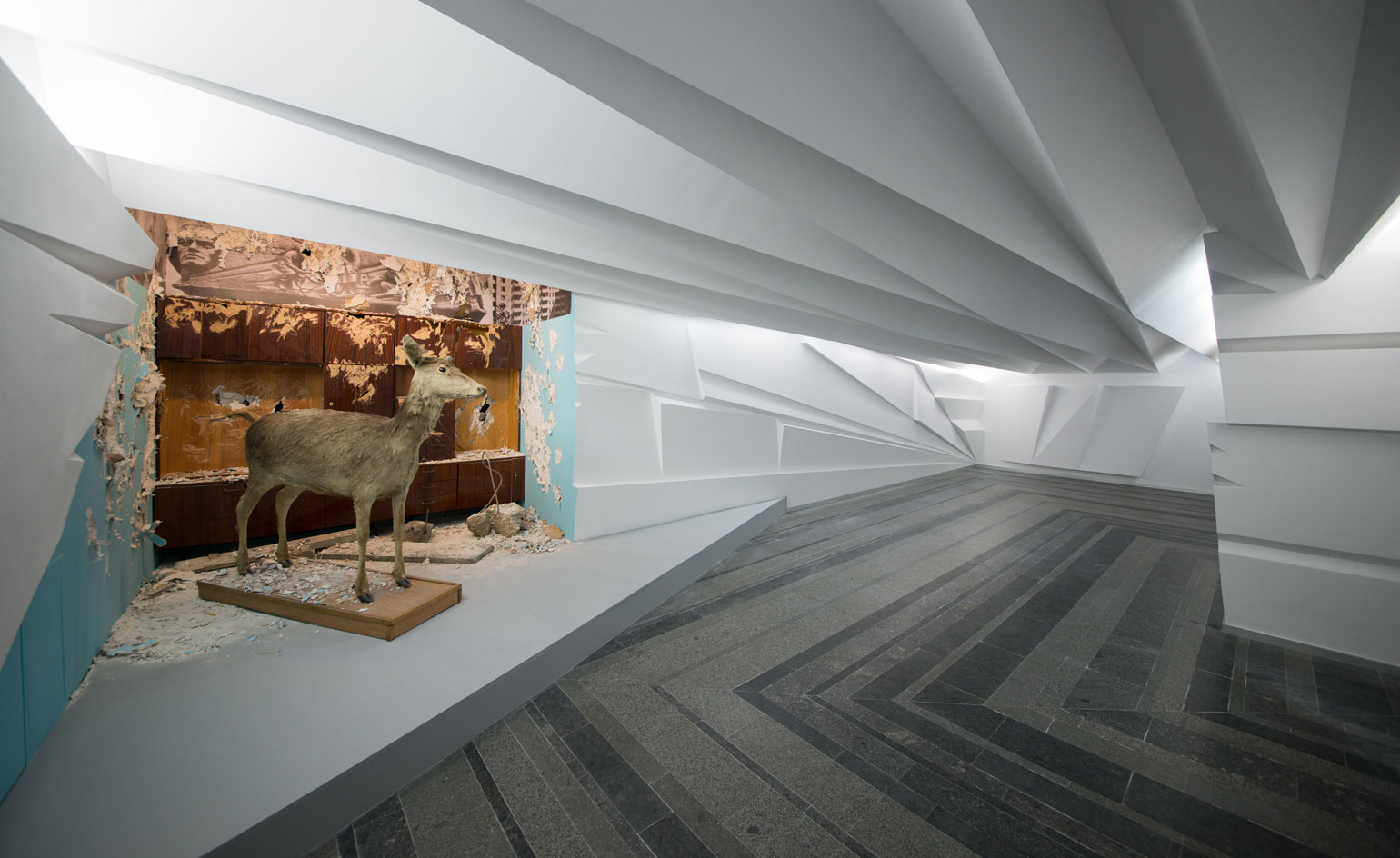
'Hold the Thought, Where Conversation Was Interrupted', 2014, by Ukrainian artist Nikita Kadan, who was awarded a Special Prize for his claustrophobic intervention wittily playing on expectations of narrative in a traditional white cube gallery space
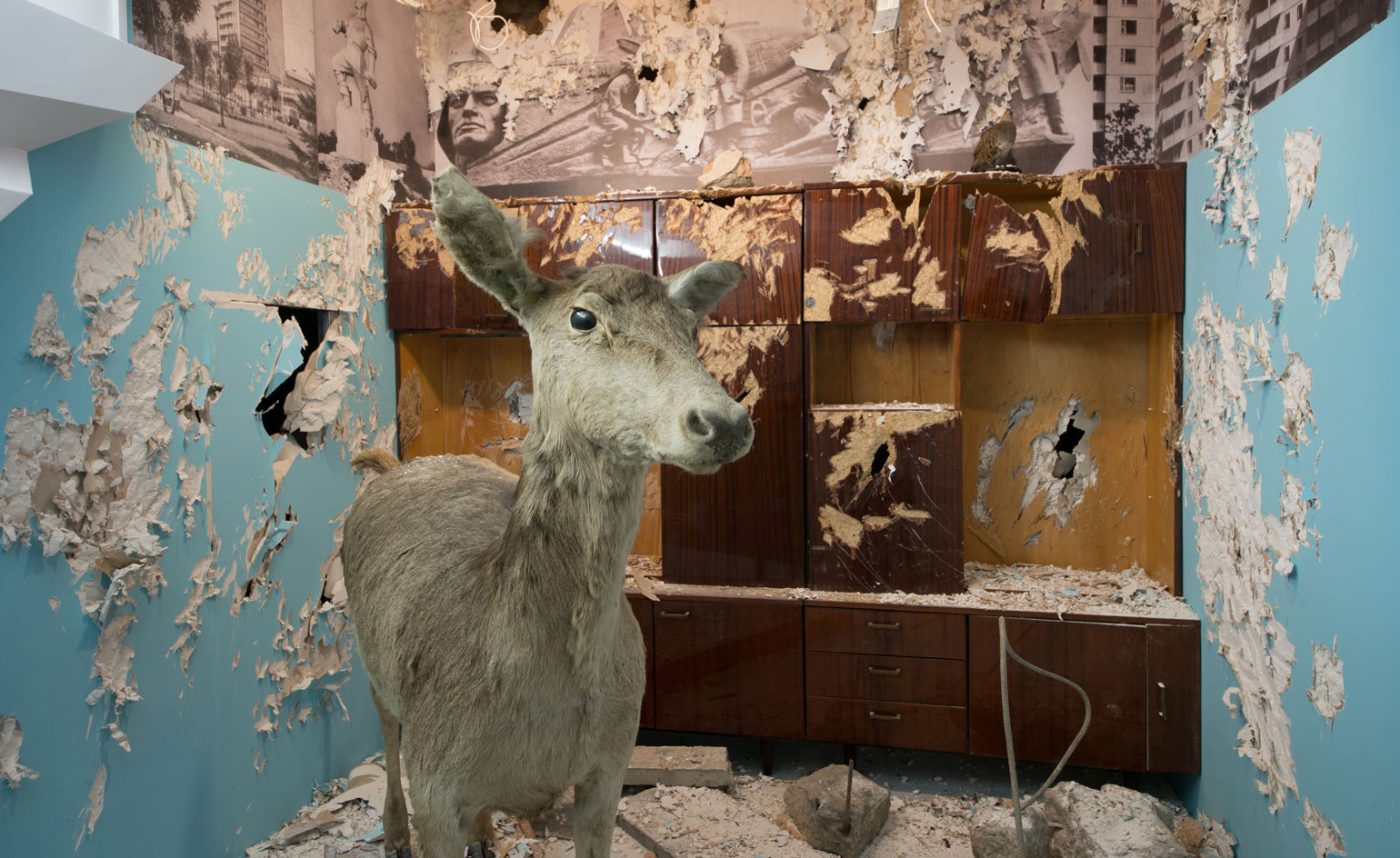
Elements of Kadan's artwork refer to the Soviet neo-modernistic war memorials - specifically to a certain tradition of using geometrical and abstract details in them - as well as a certain expression that is characteristic of the Soviet monumental art
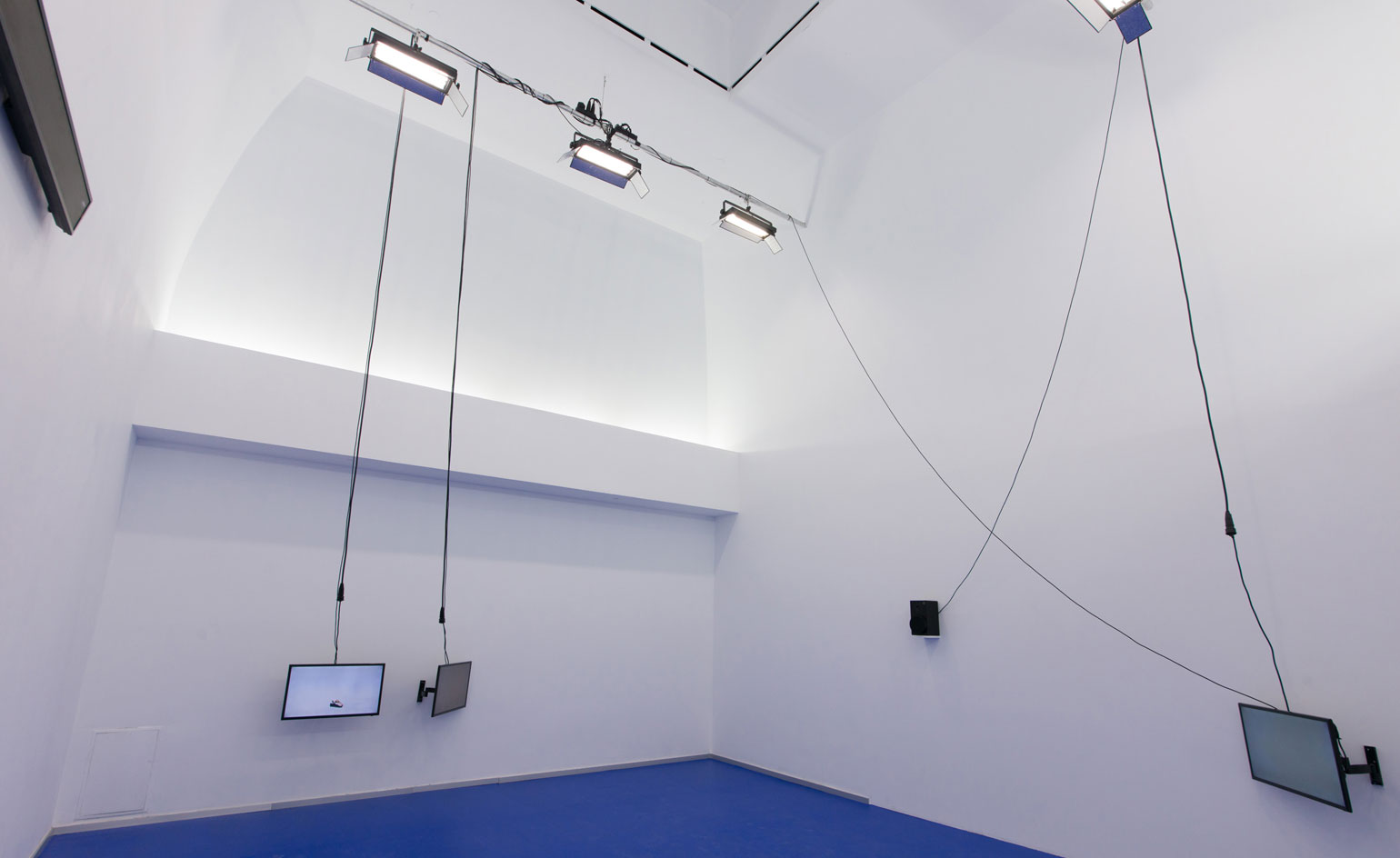
British artist Cally Spooner makes work exploring technology and dependence on others - or how technology stands in for the human body. Pictured is 'Off Camera Dialogue', 2014
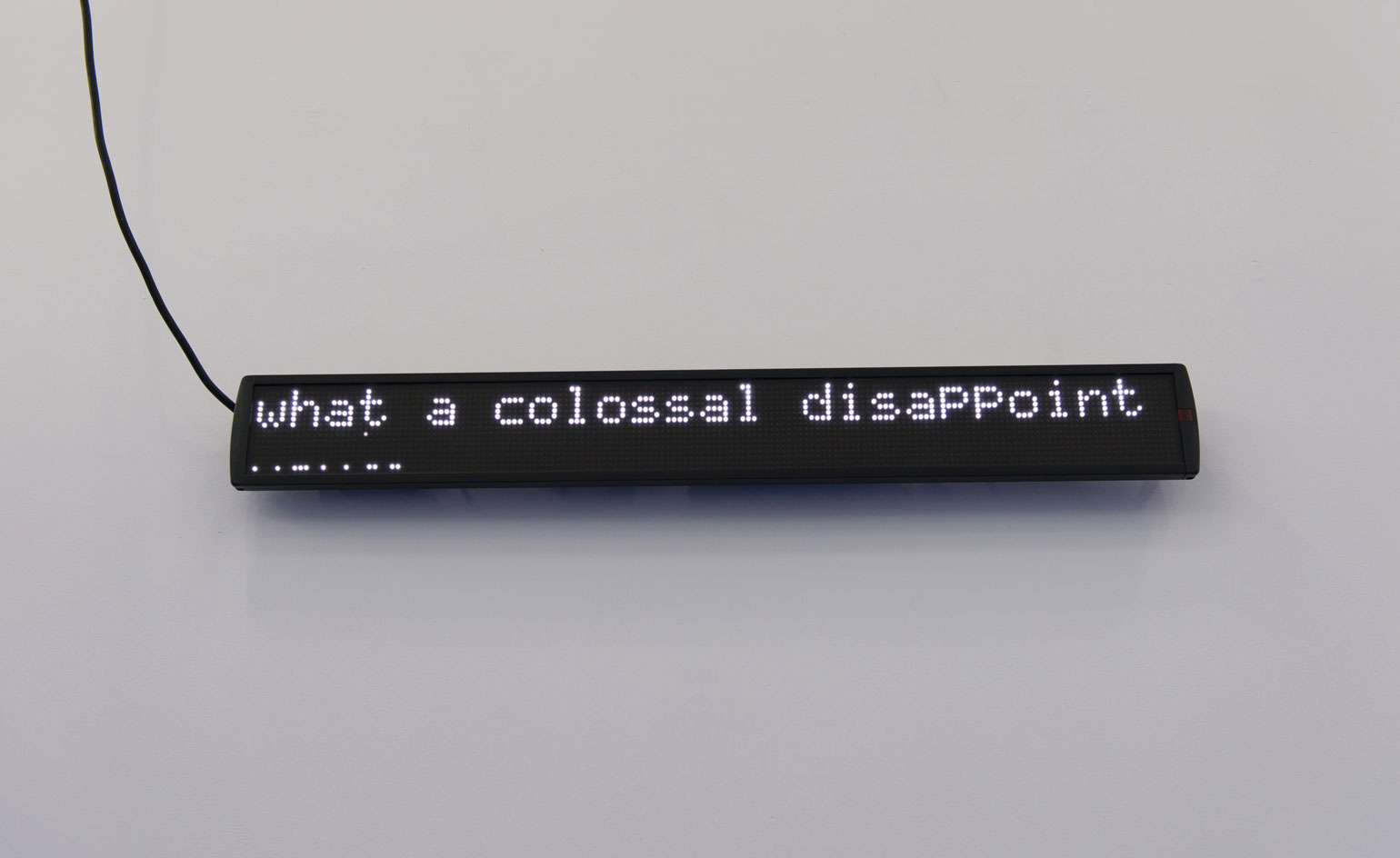
'Damning Evidence Illicit Behaviour Seemingly Insurmountable Great Sadness Terminated In Any Manner', by Cally Spooner, 2014
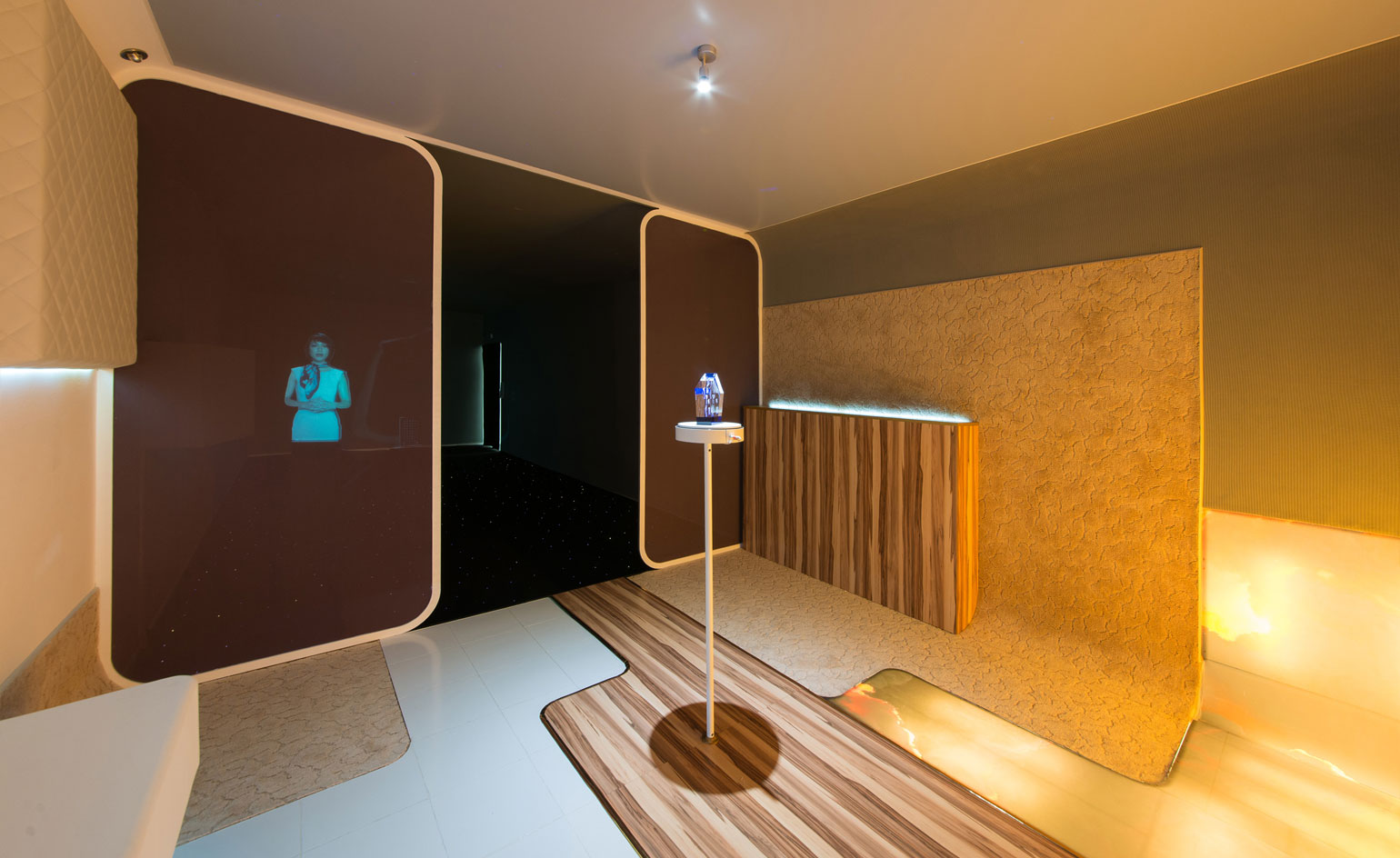
Artist group GCC from the Arabian Gulf Region has built an installation based on the cosmetic, synthetic world of luxury flights for 'Exosphere', 2014
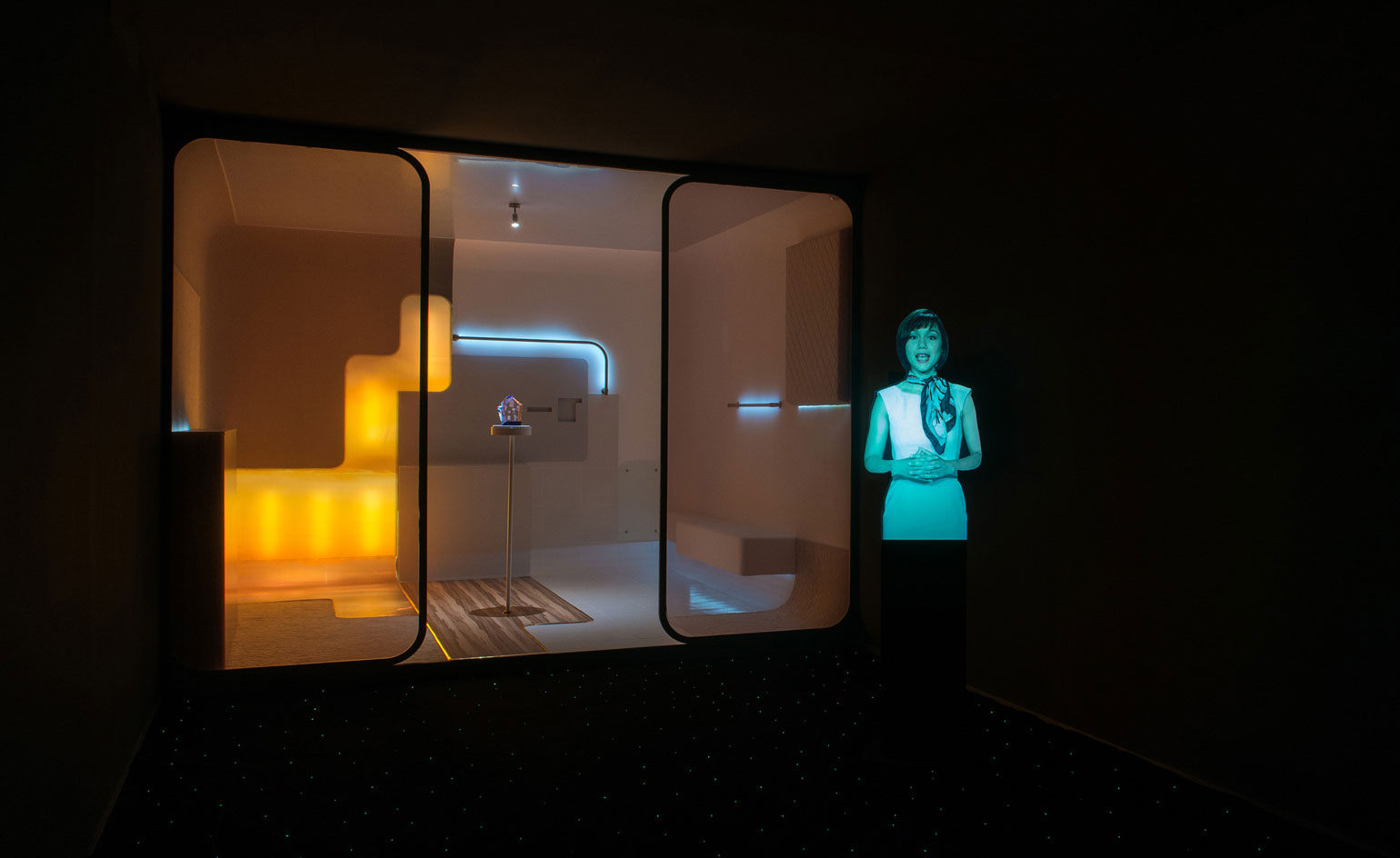
The viewer is bombarded with words and phrases gleaned from advertising then strung together in nonsensical ways by a cardboard air-hostess: 'Welcome to a more comfortable vertical world. Whoever consumes to his greed shall have ten times growth to his credit'
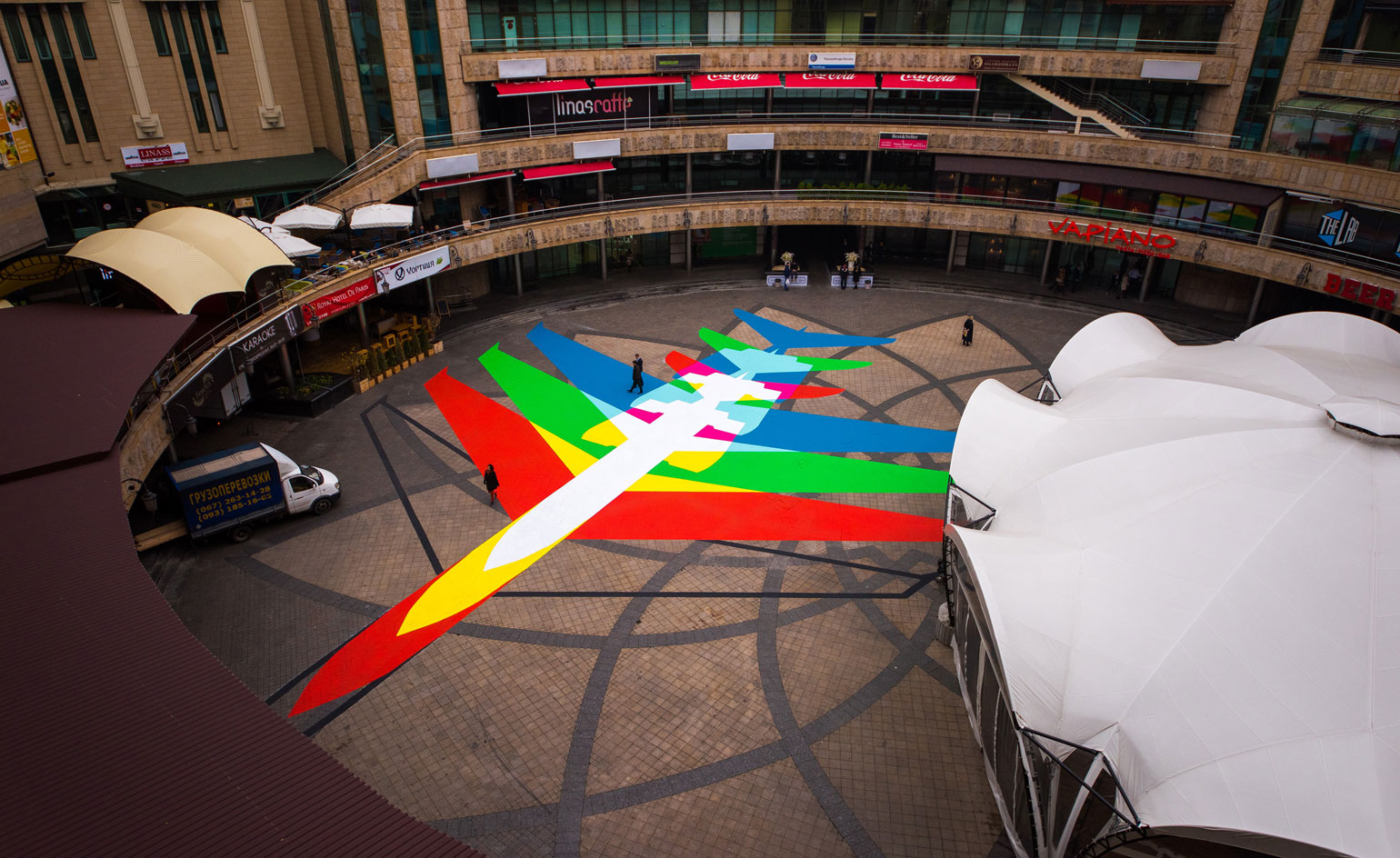
'Rainbow Plane 002' by British artist and writer James Bridle was painted onto the ground outside. He described it as an image of a jet plane as seen by satellite when it's moving very quickly so that the colours of the engine parts have separated. 'It's not just beautiful, it's also a way of seeing how the technology functions'
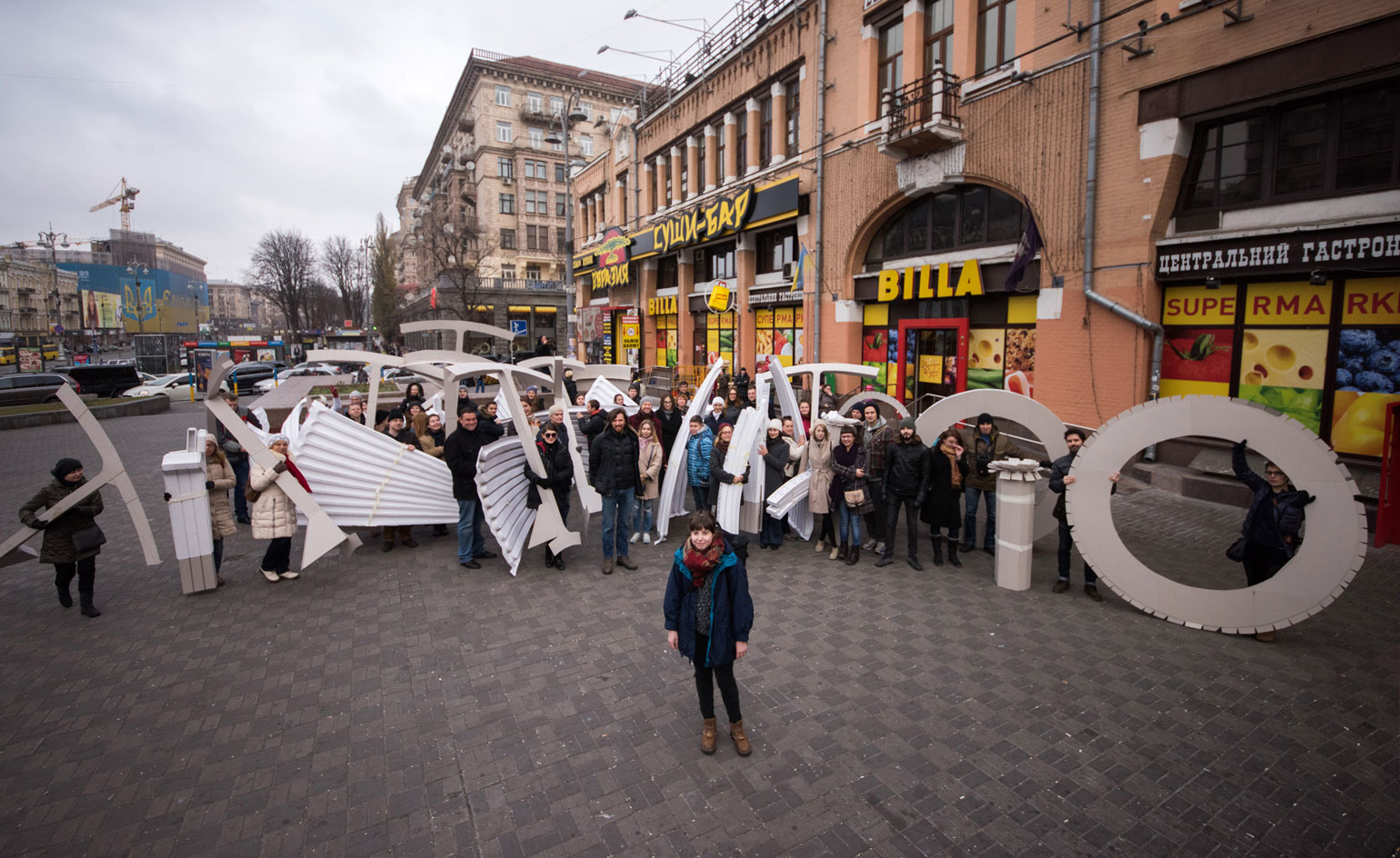
Chilean artist Pilar Quinteros (pictured centre, along with participants of her performance) reconstructed a vanished fountain at Maidan - the site in Kiev of the main protest camp in February - out of paper, before asking people to destroy it
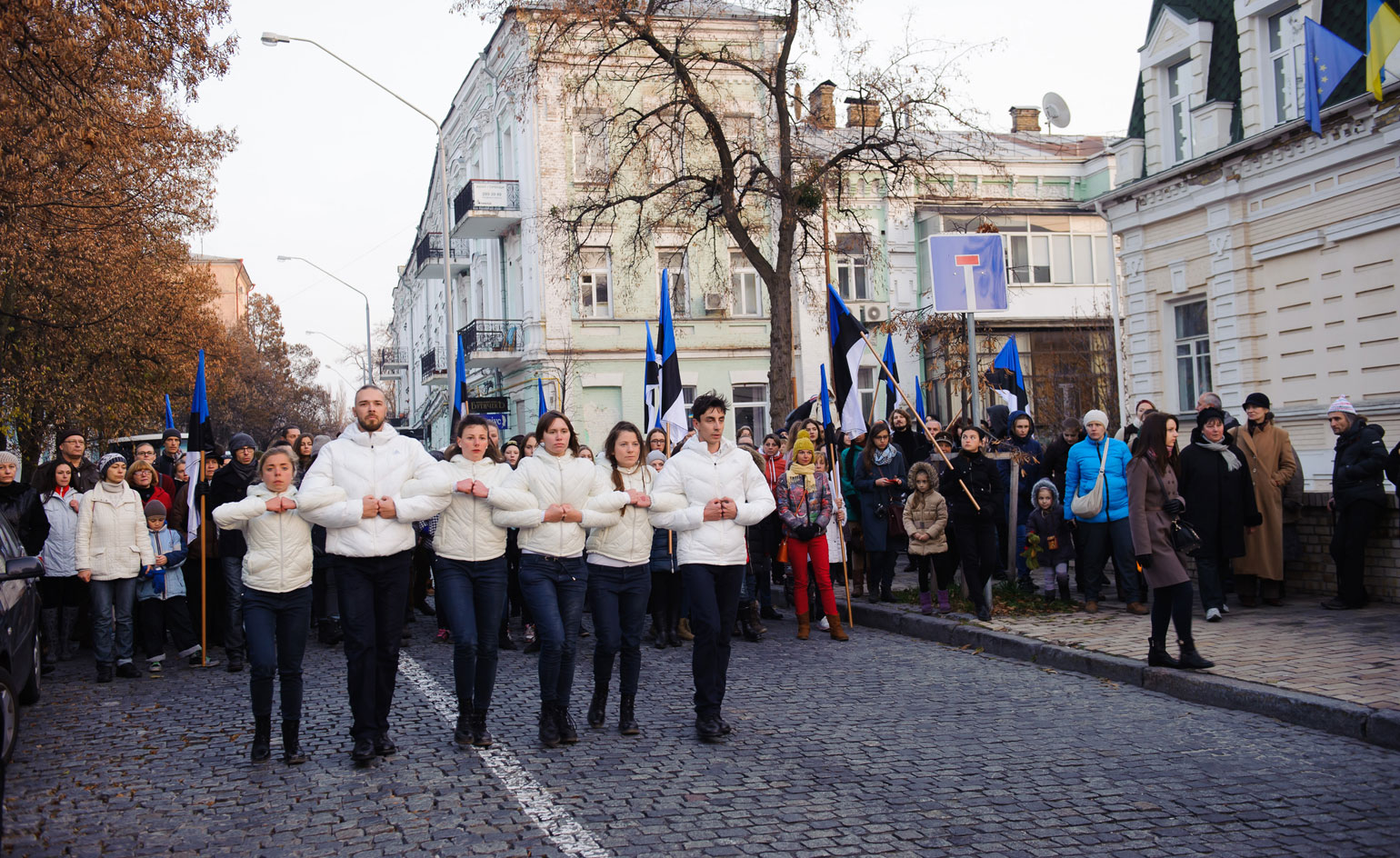
Israeli performance art group Public Movement took to the streets of Kiev to perform 'Cross Section', which explores how cities are used as sites of political strife and unification through dance, theatre and music
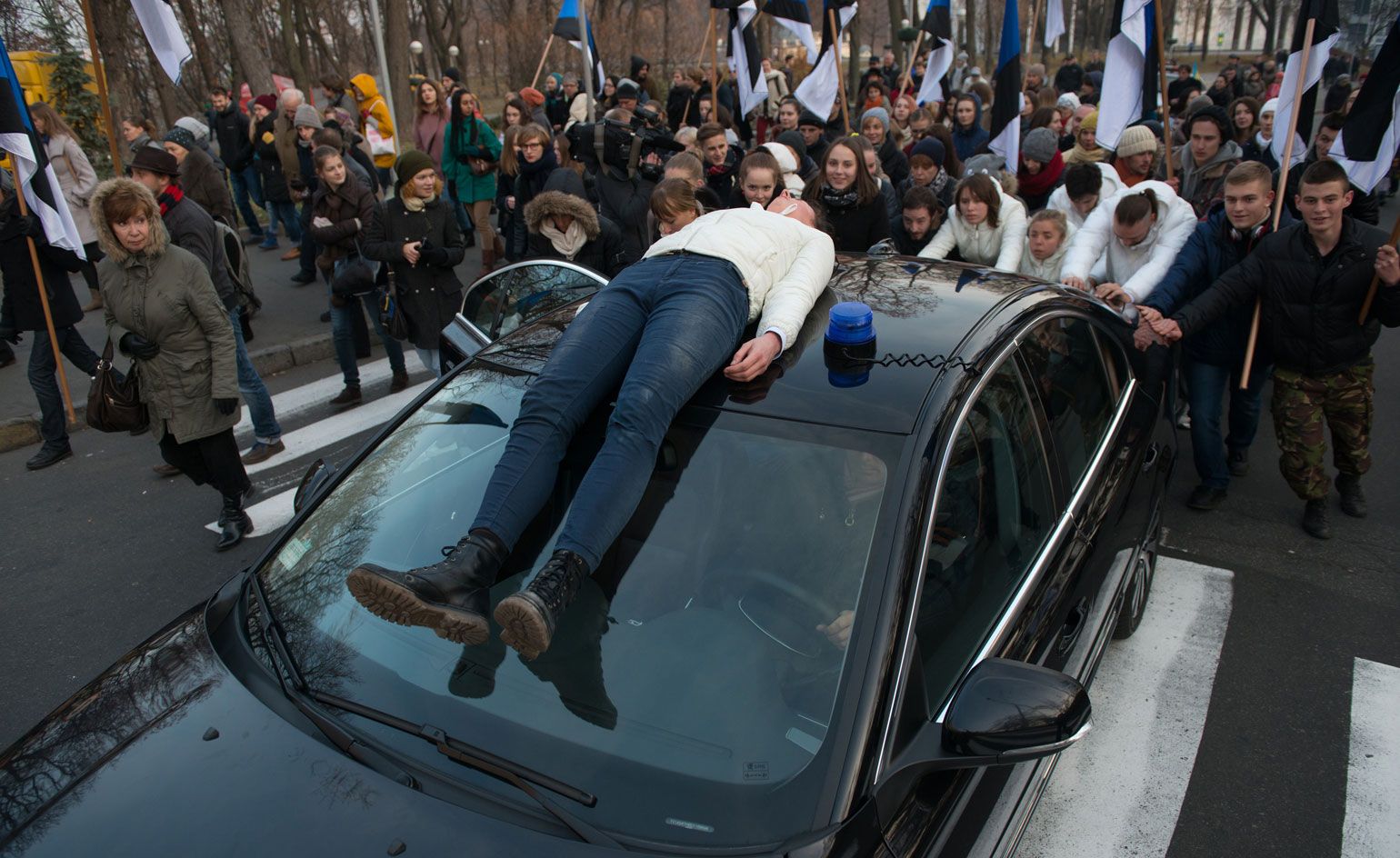
The group led a crowd symbolically through the city’s snow-laden streets. More than 200 young people turned out to witness the hour-long performance
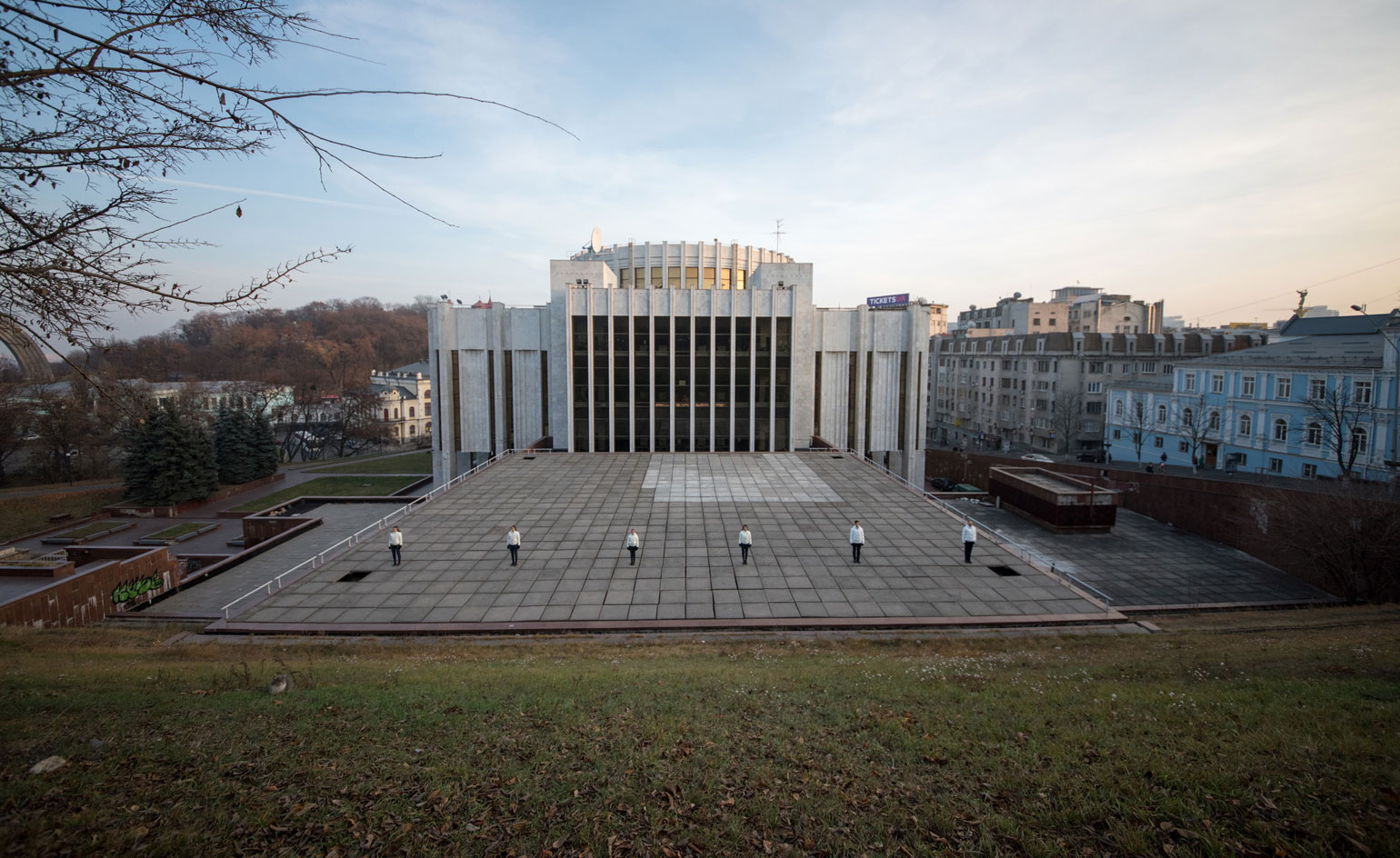
'Cross Section', by Public Movement, 2014
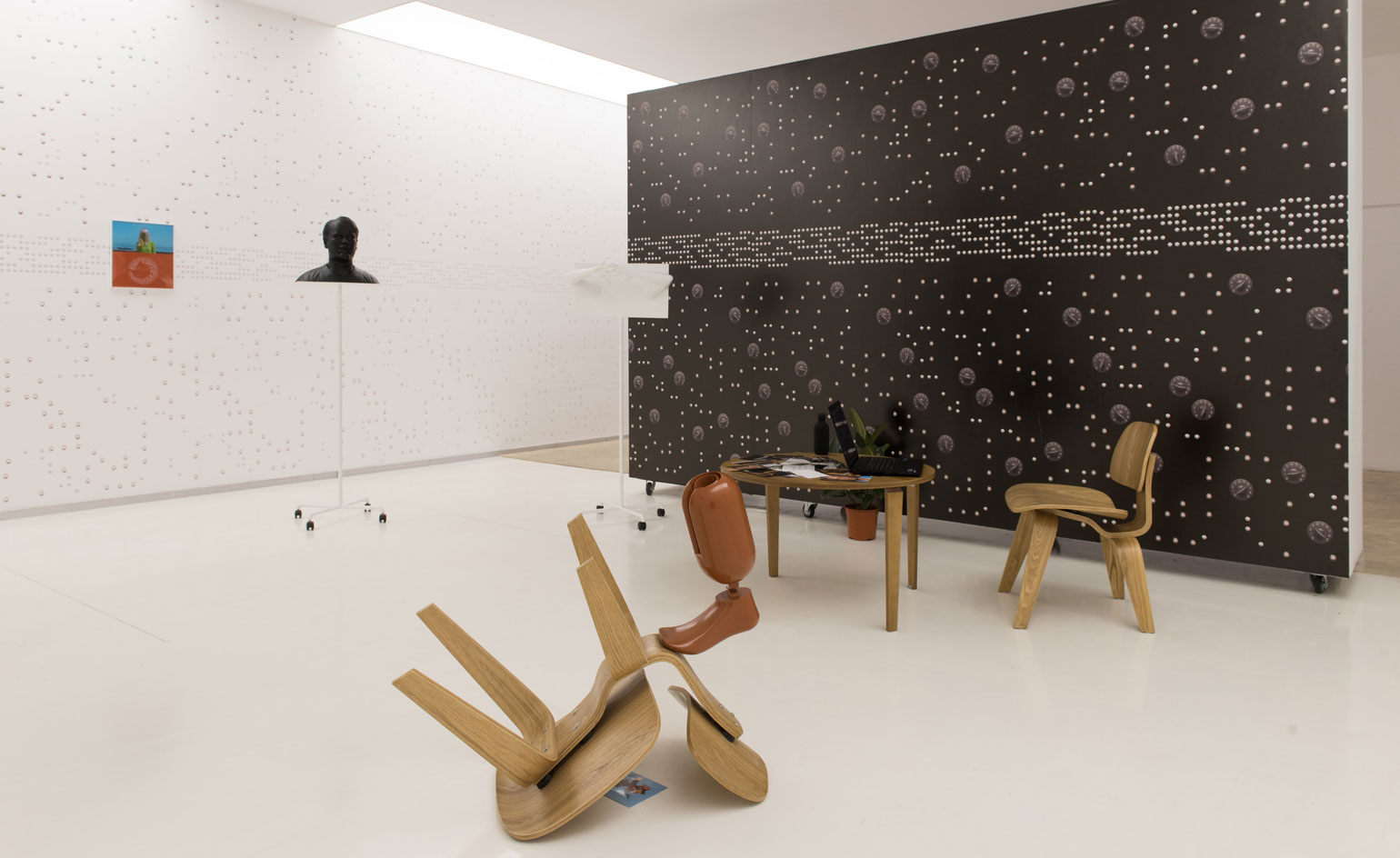
Installation view of American-Belgian artist Cécile B Evans' 'What a Feeling' at the Pinchuk Art Centre
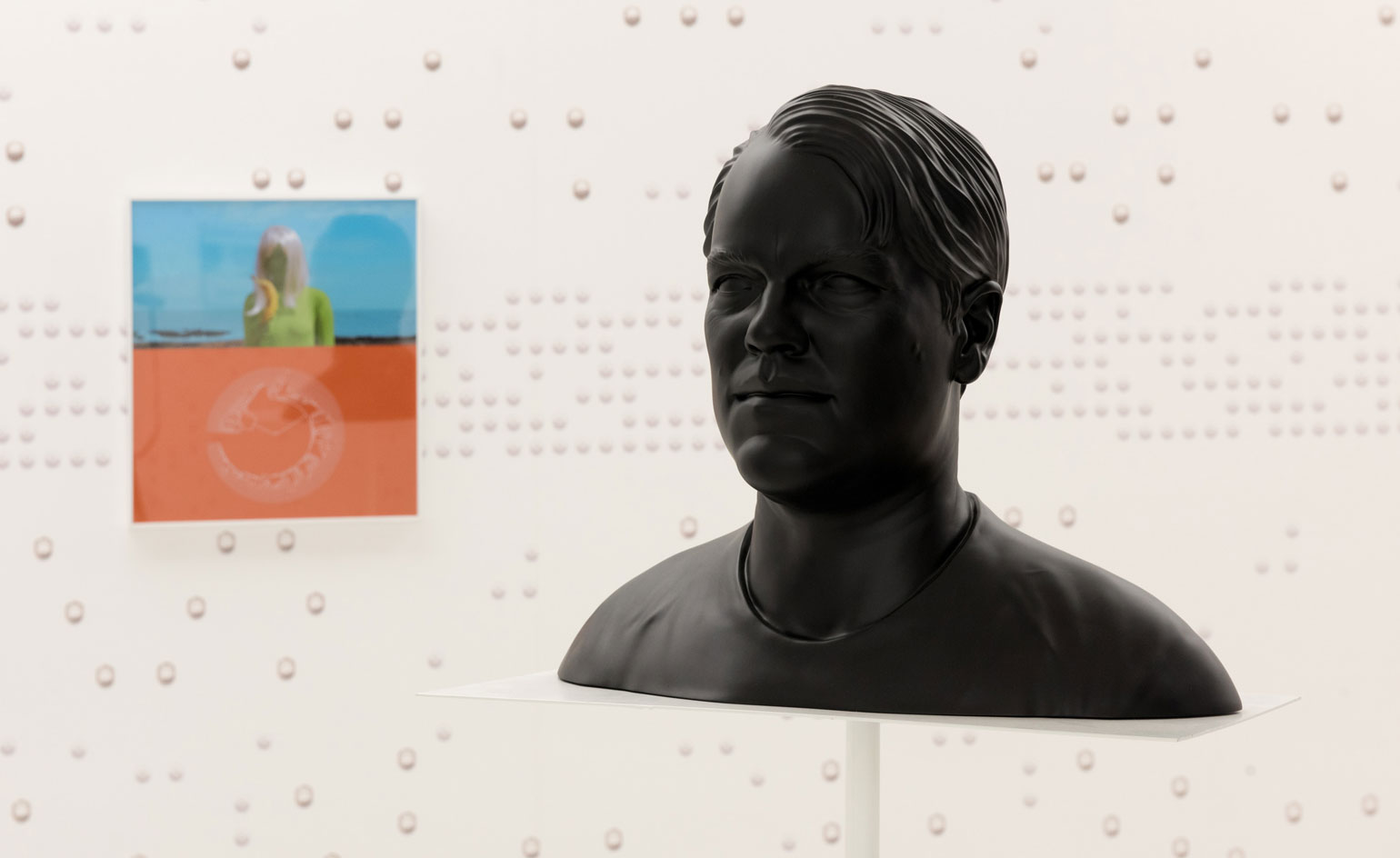
The work features the film of an avatar of the late actor Philip Seymour Hoffman, and explores the idea of a celebrity creating a digital afterlife
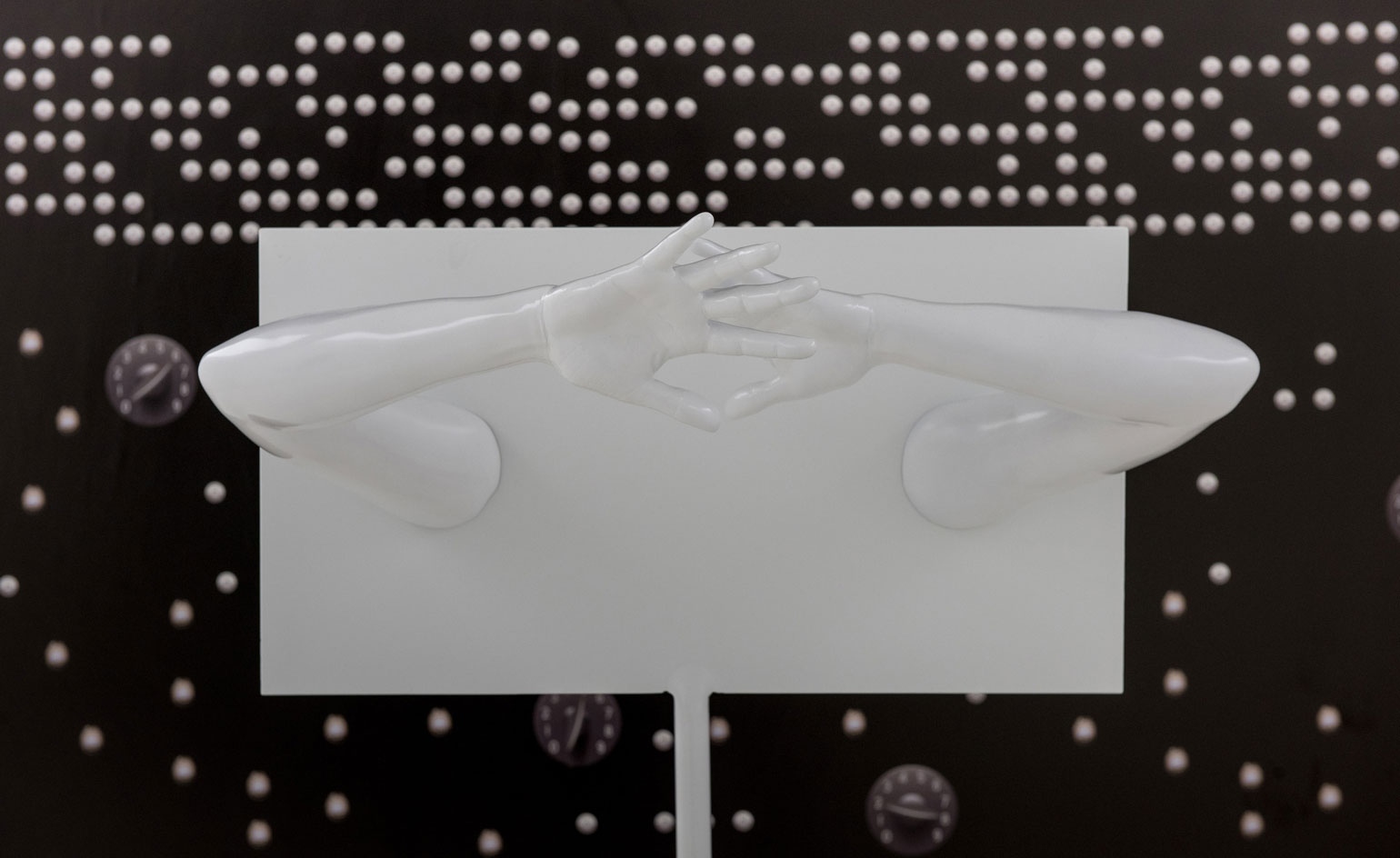
The avatar narrates the audience through the installation
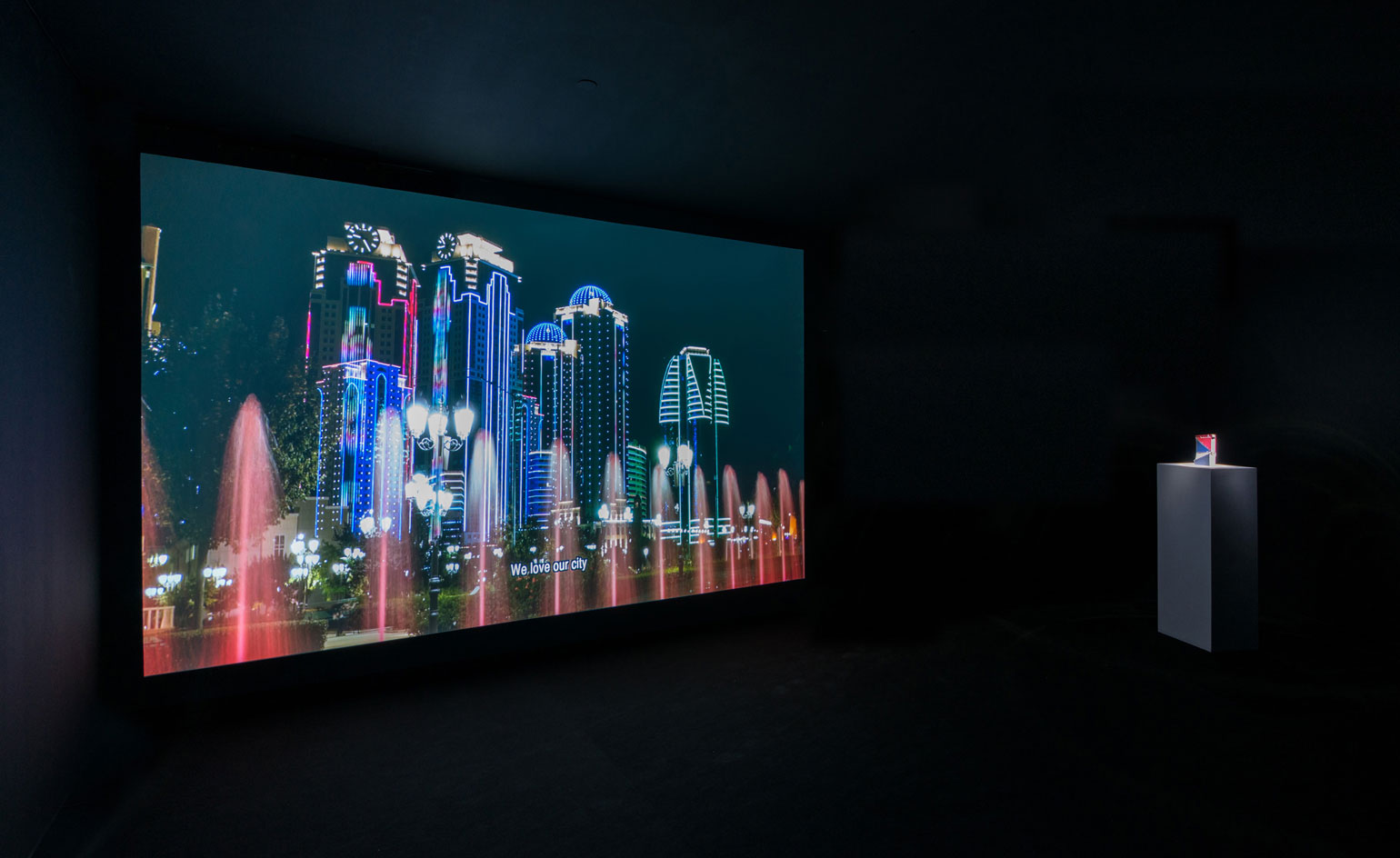
'Prospekt Pobedy', by Aslan Gaisumov, 2014
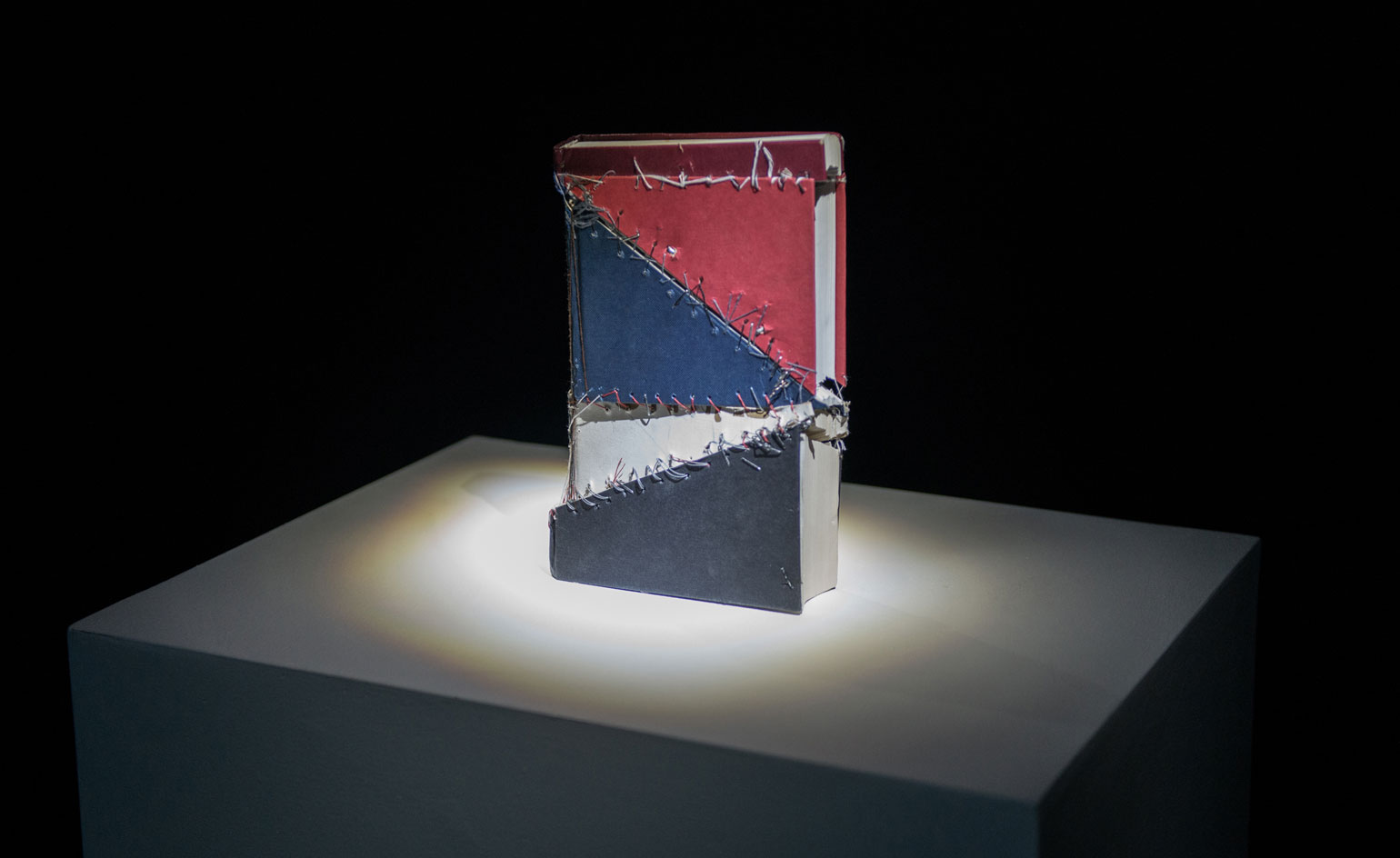
'Prosthetics', by Aslan Gaisumov, 2014
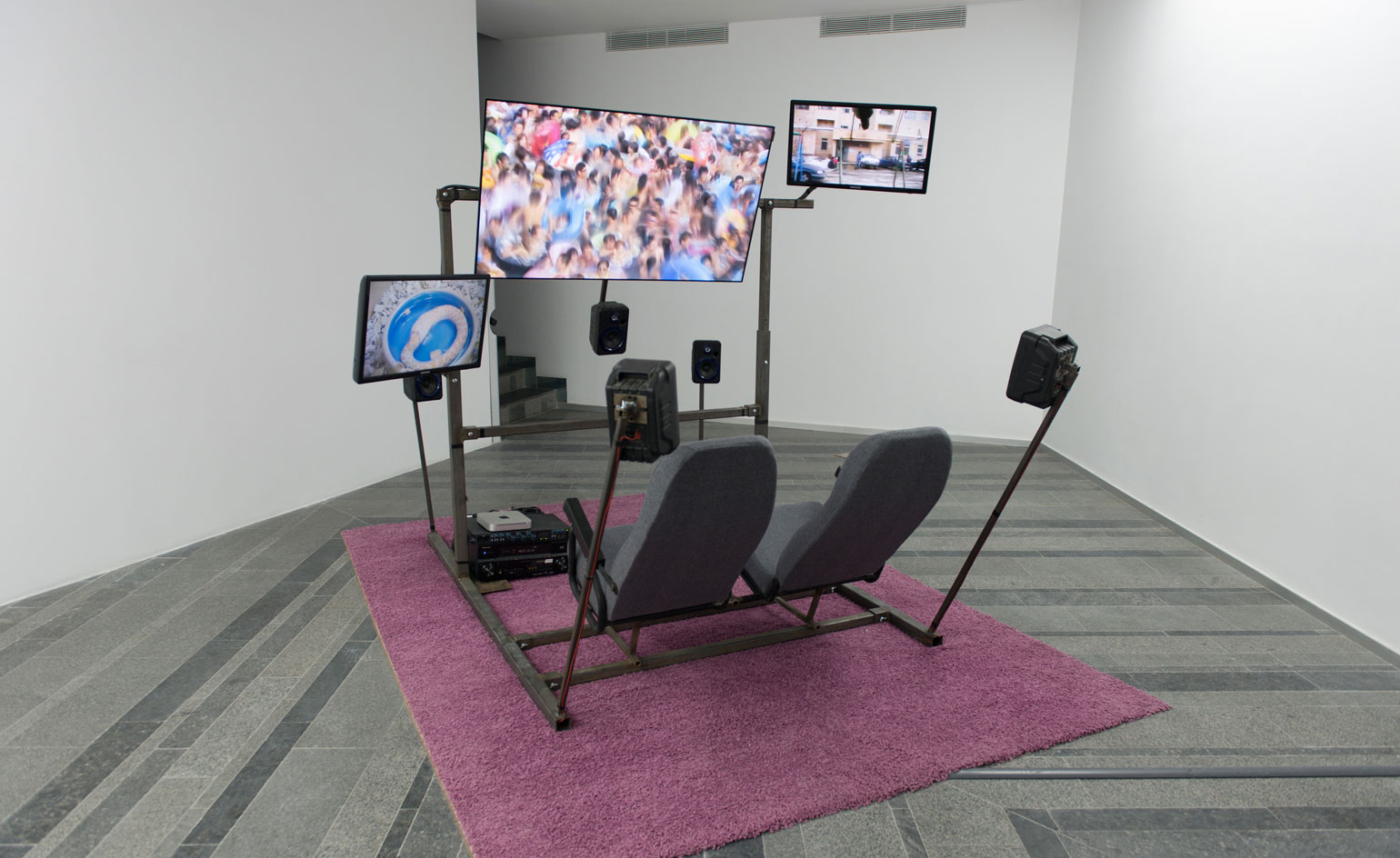
'I am alone but not lonely (Cipher)', by Jon Rafman, 2014
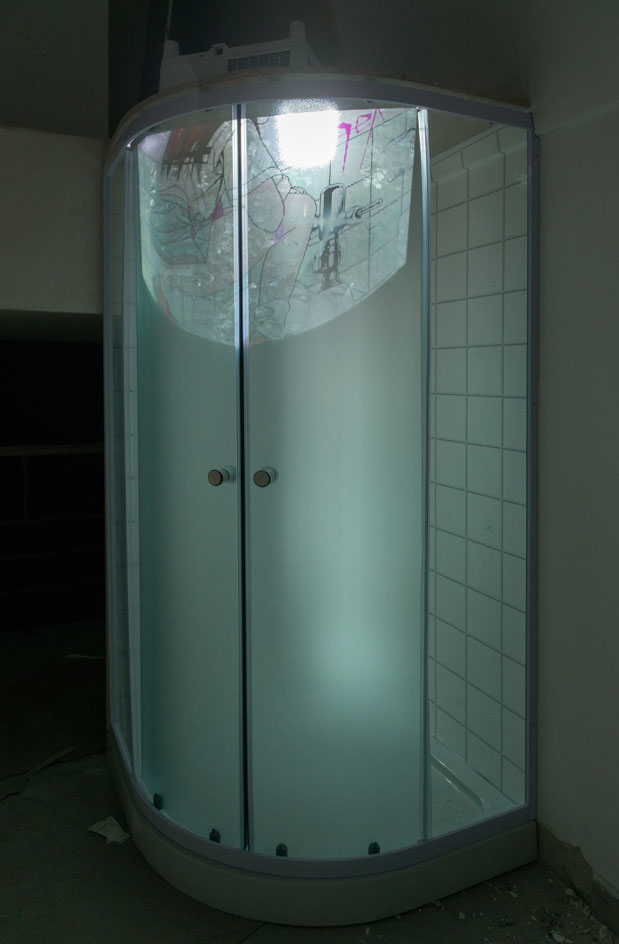
'Betamale (Portal)', by Jon Rafman, 2014
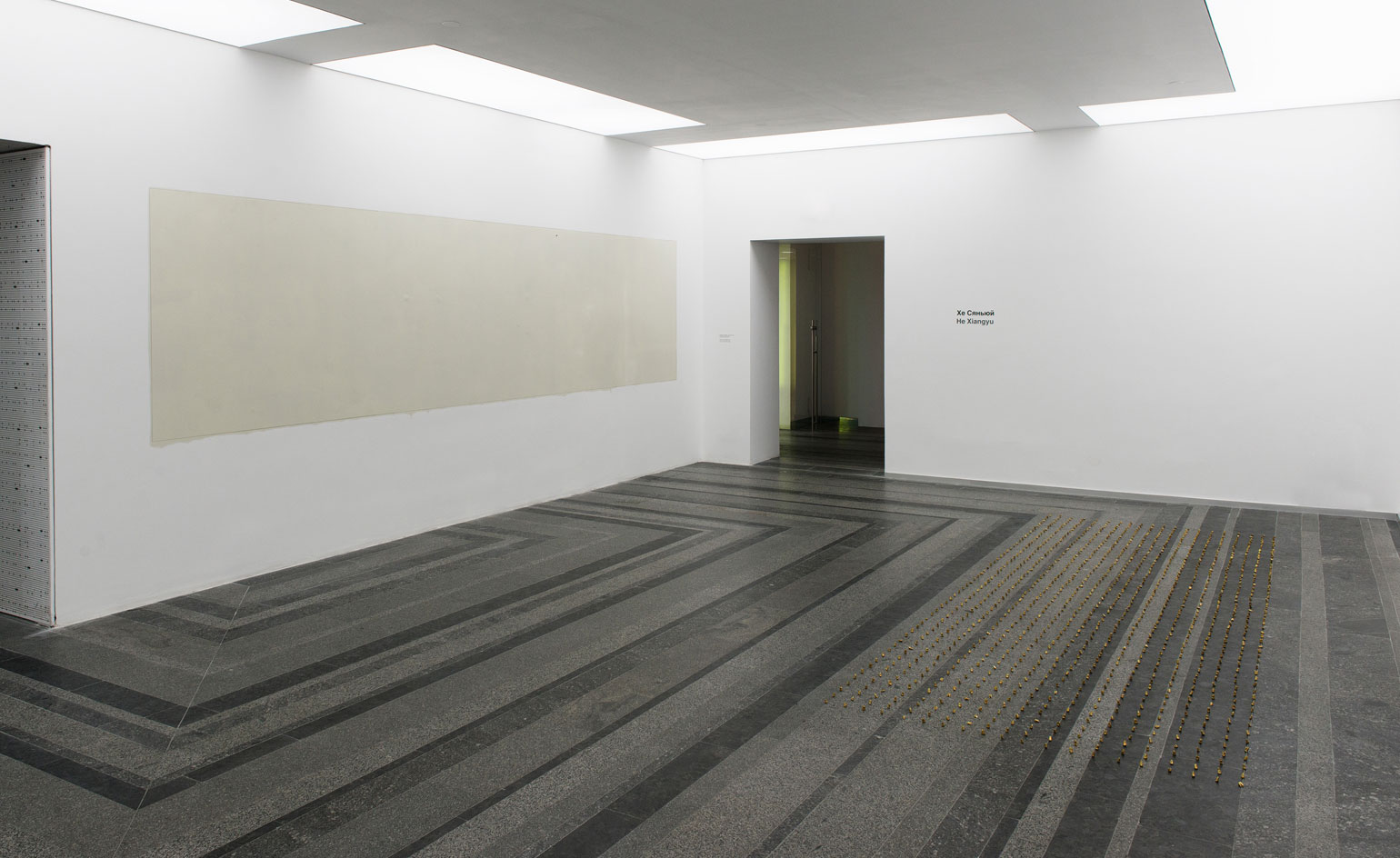
Minimalist Chinese artist He Xiangyu's 'Olive Oil. Past is Prologue', 2014, is a mural painted within a pencil square in pure olive oil
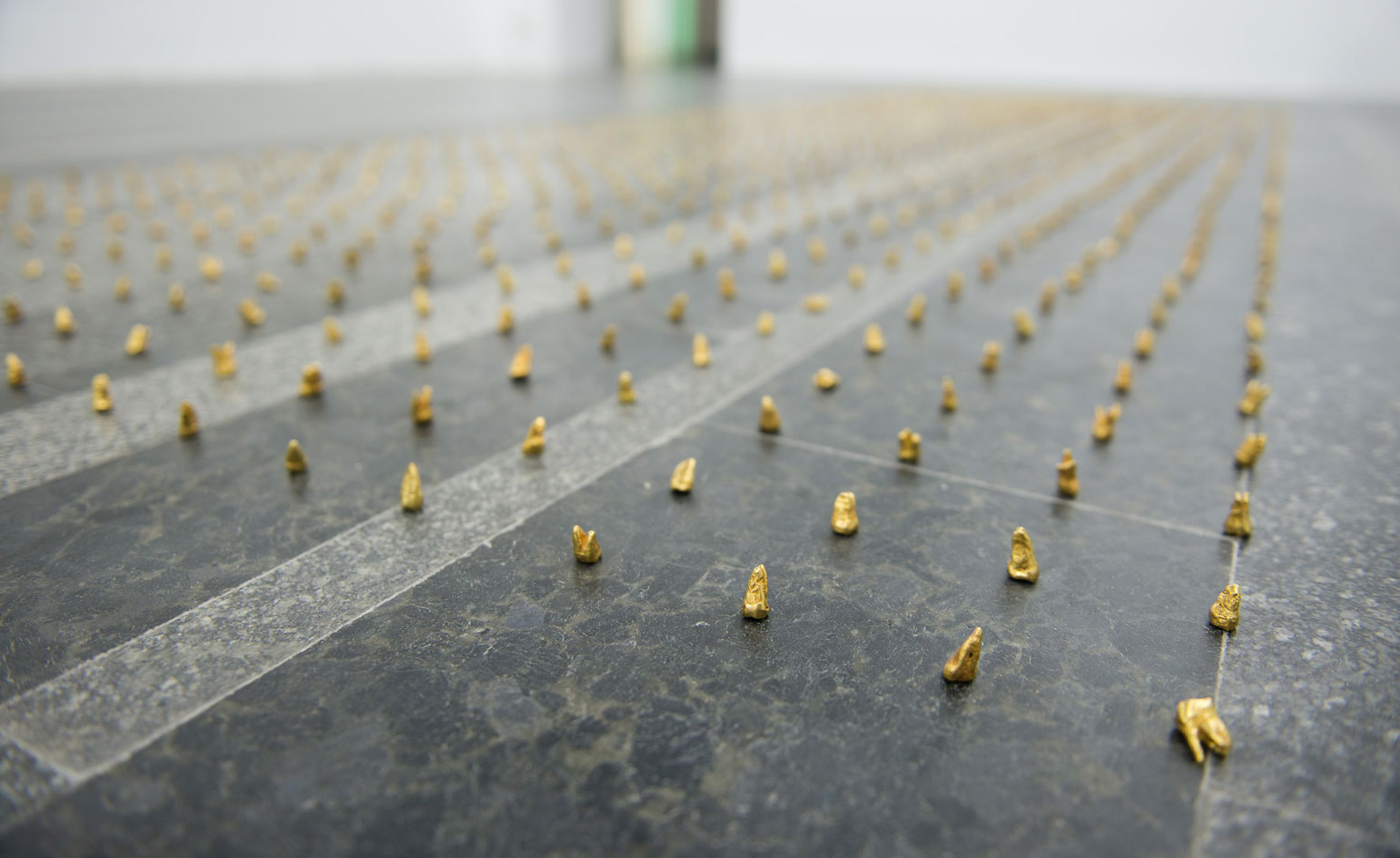
He Xiangyu's 'Wisdom Teeth', 2013-2014, are cast in 99% pure gold and copper. The artist explains, 'I wanted to make them look like seeds on the floor, growing by themselves'
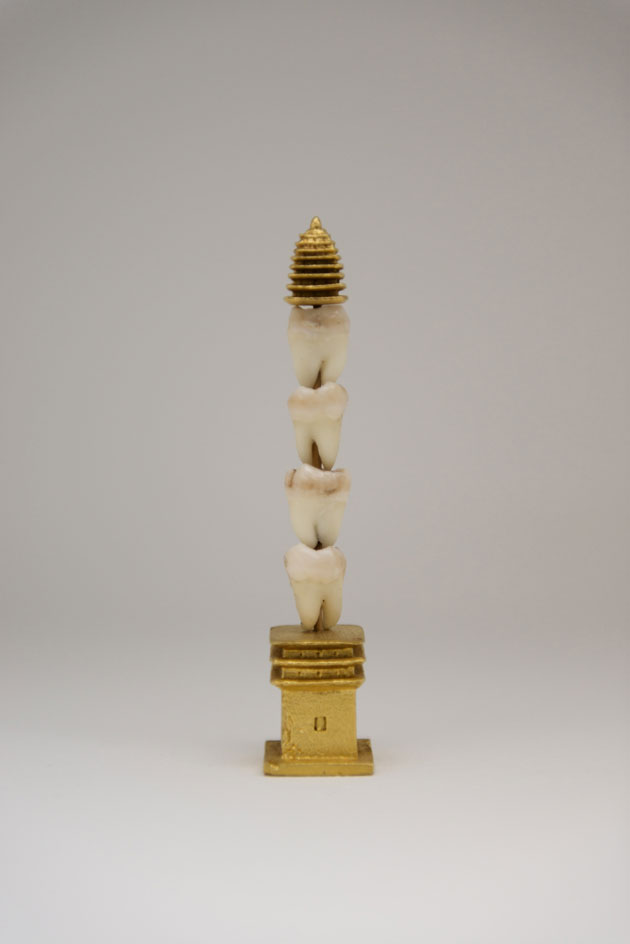
'Wisdom Tower', by He Xiangyu, 2013
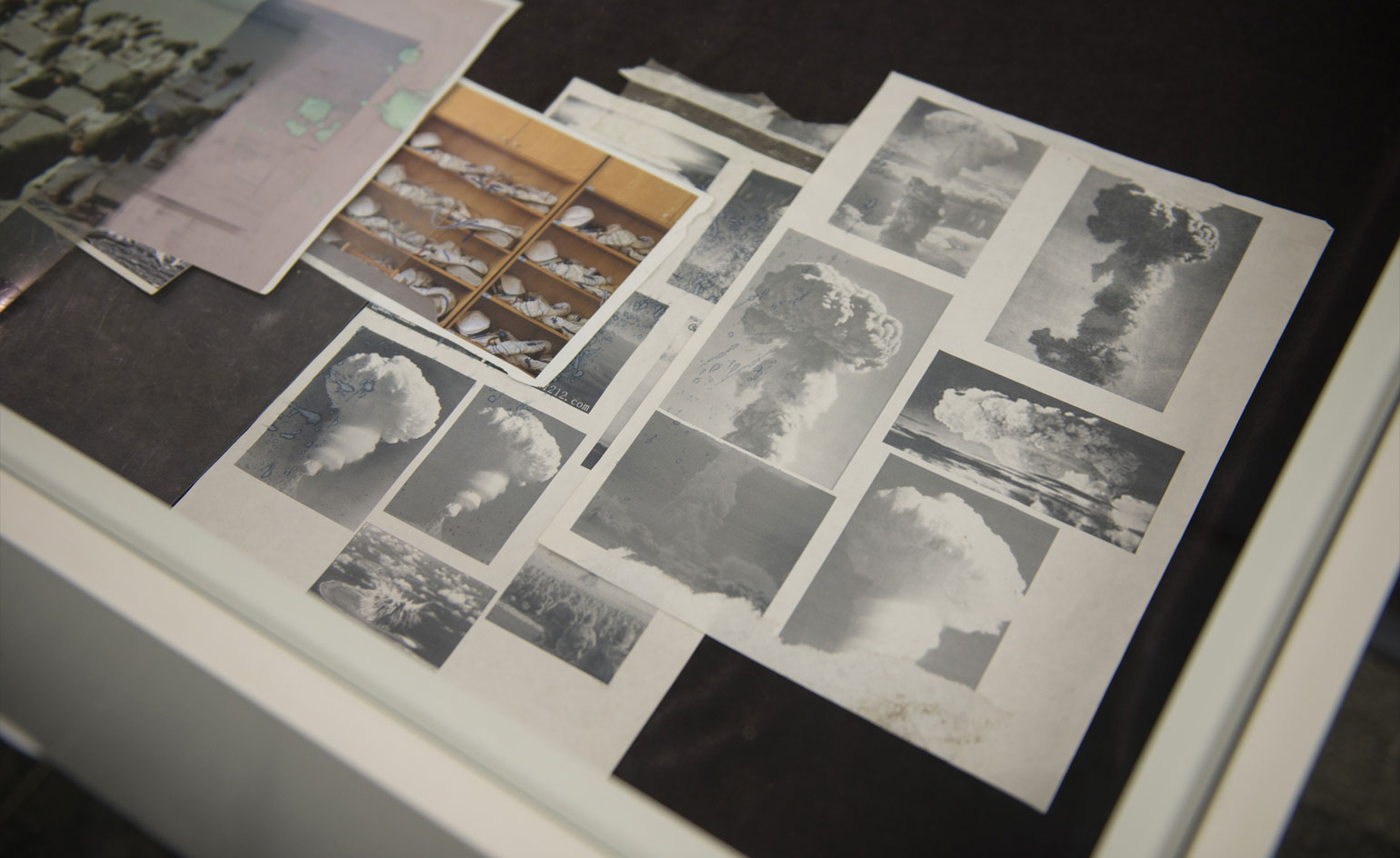
'Manuscripts', by Jia Aili
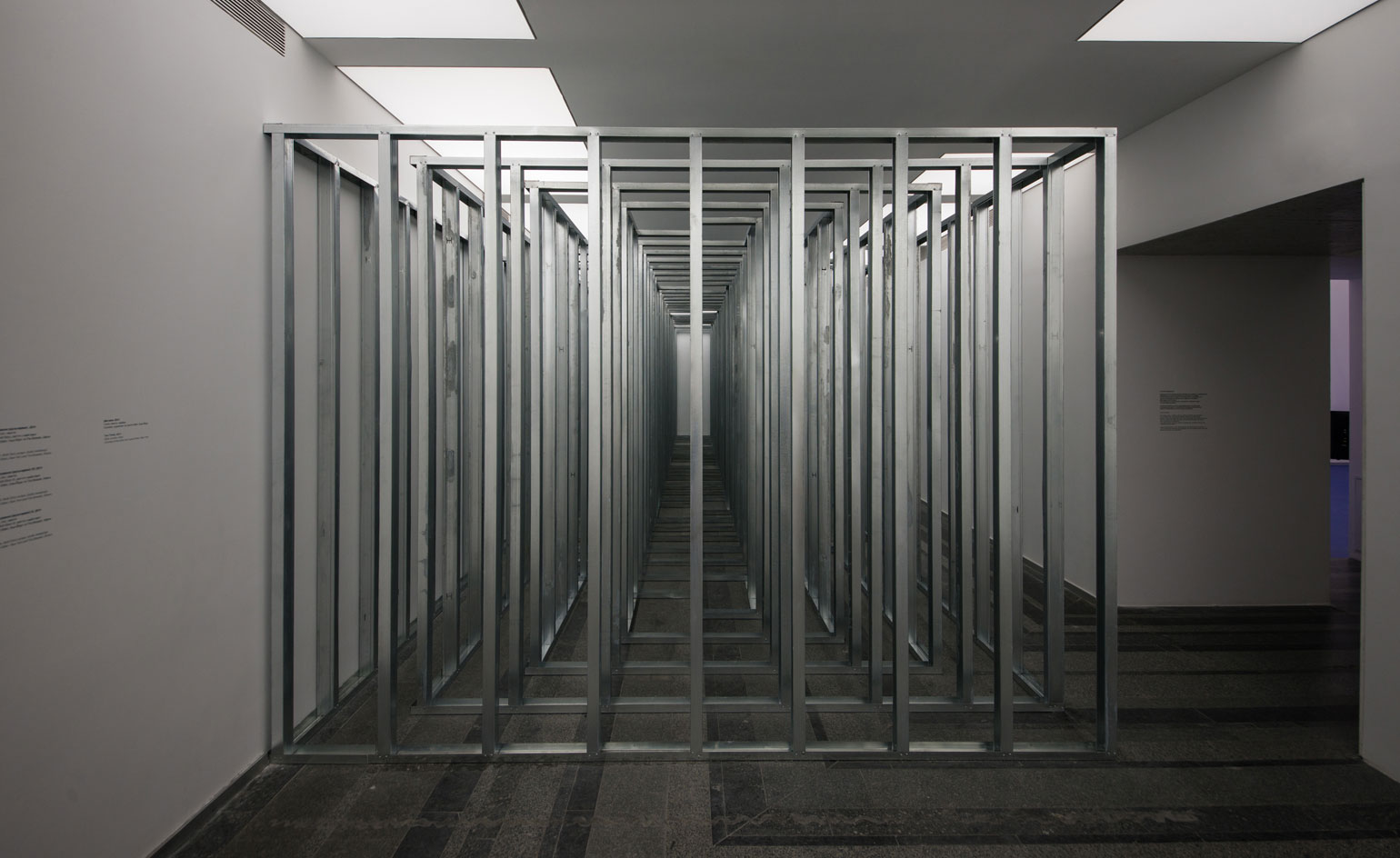
American artist Allyson Vieira's 'Meander' installation is an unwalled labyrinth containing a long path within it. Built with steel and screws, the form of the path adheres to classical Greek geometry. 'You cannot get lost in a labyrinth, you can only move forward,' she says
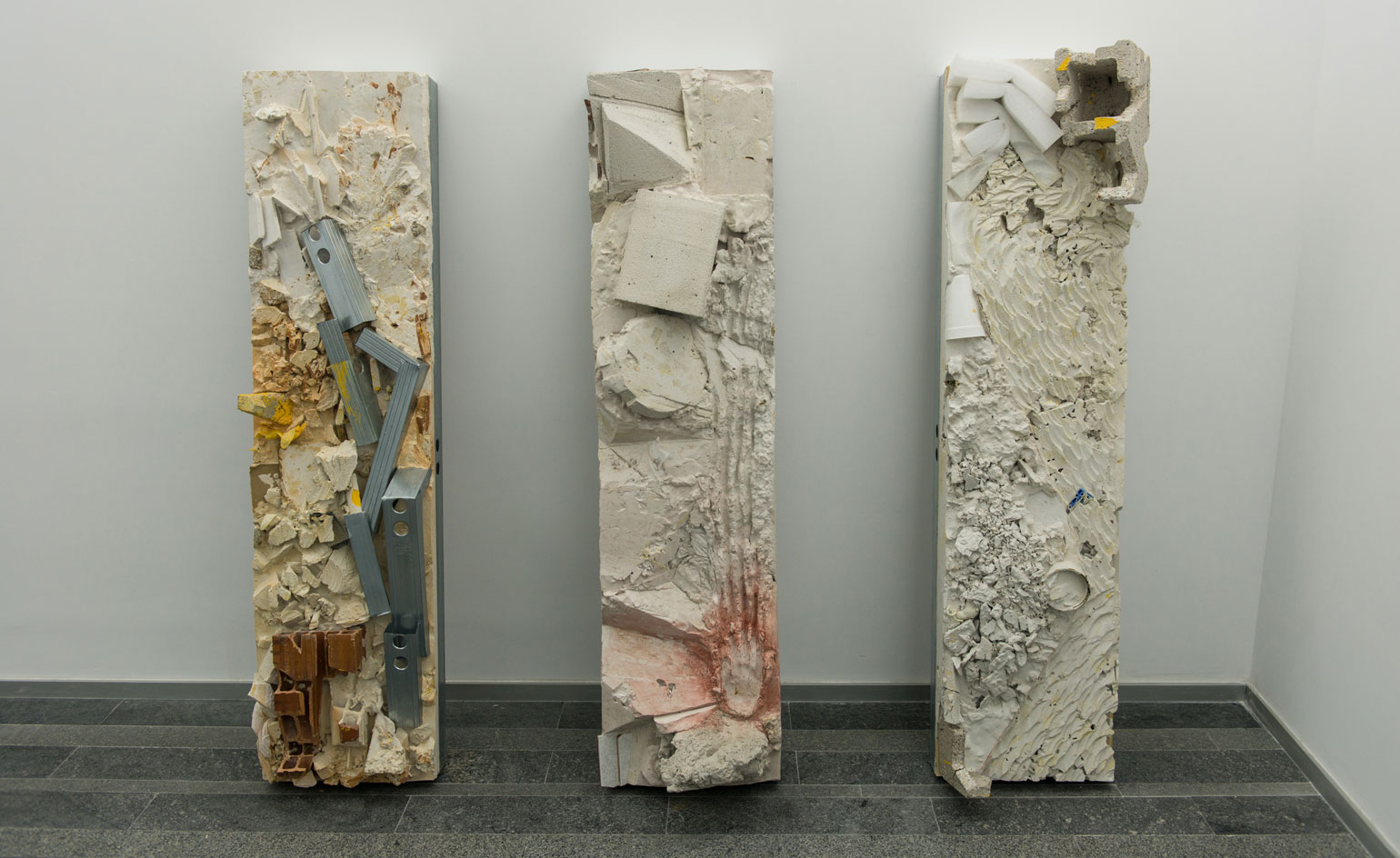
'Clad (Multi Story)', by Allyson Vieira, 2014
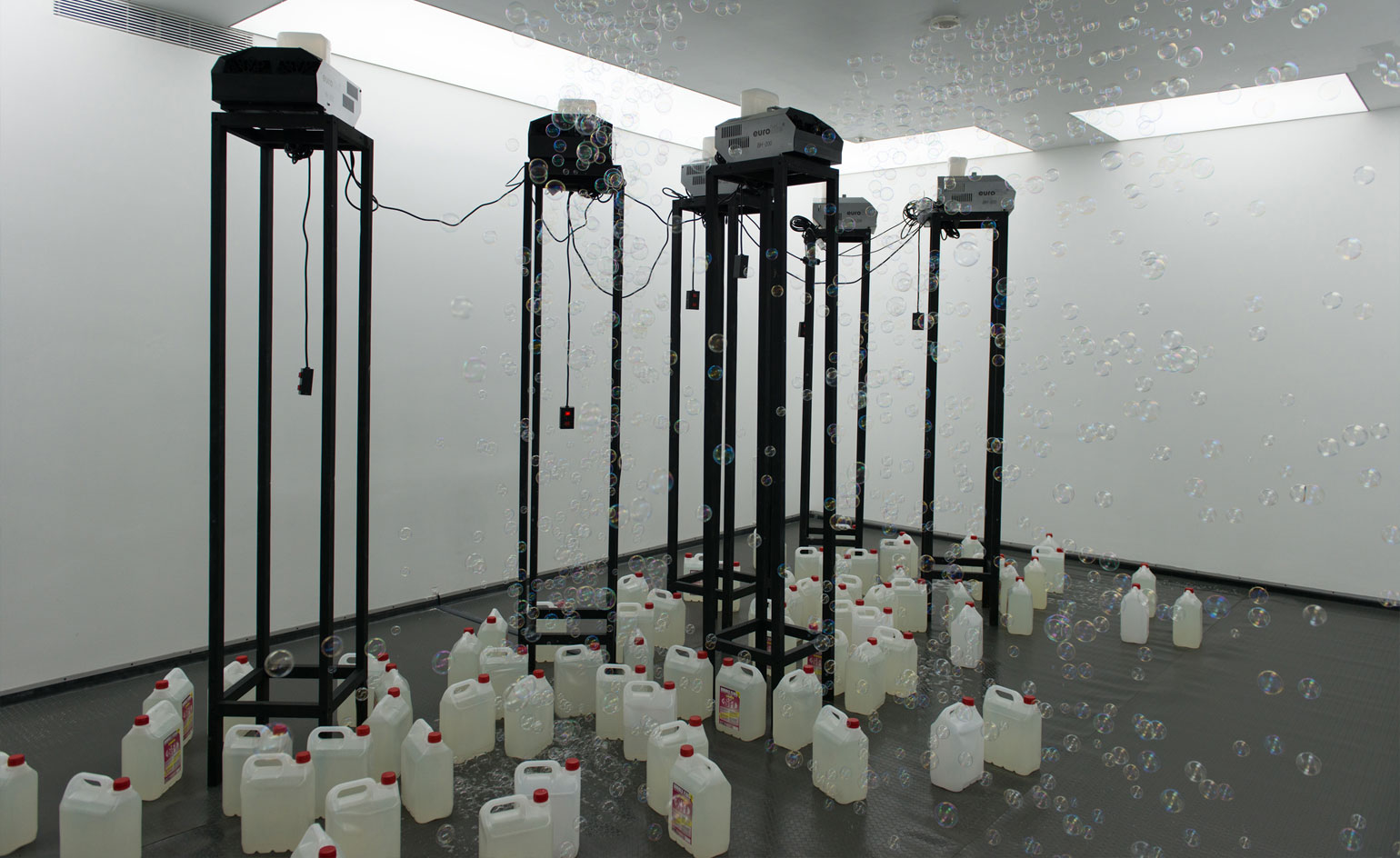
'The Power of the Working Class', 2014, is an installation of bubble-machines by Havana-born Adrian Melis. Melis made a series of audio recording at demonstration and political protests in Spain. He has synchronised the intensity of noise from the protests with the intensity of bubbles being produced
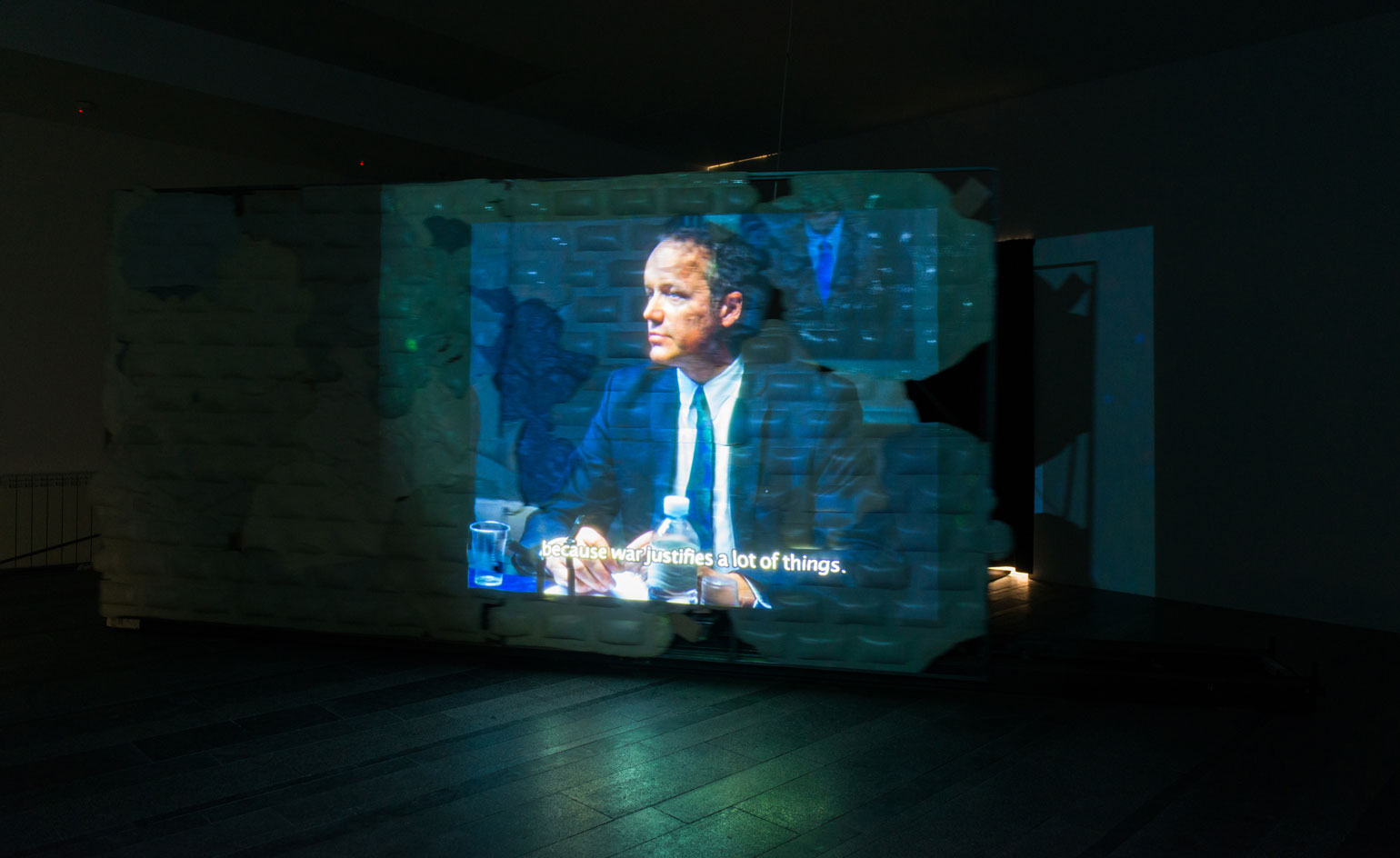
'Moving wall, World Domination', by Neïl Beloufa, 2014
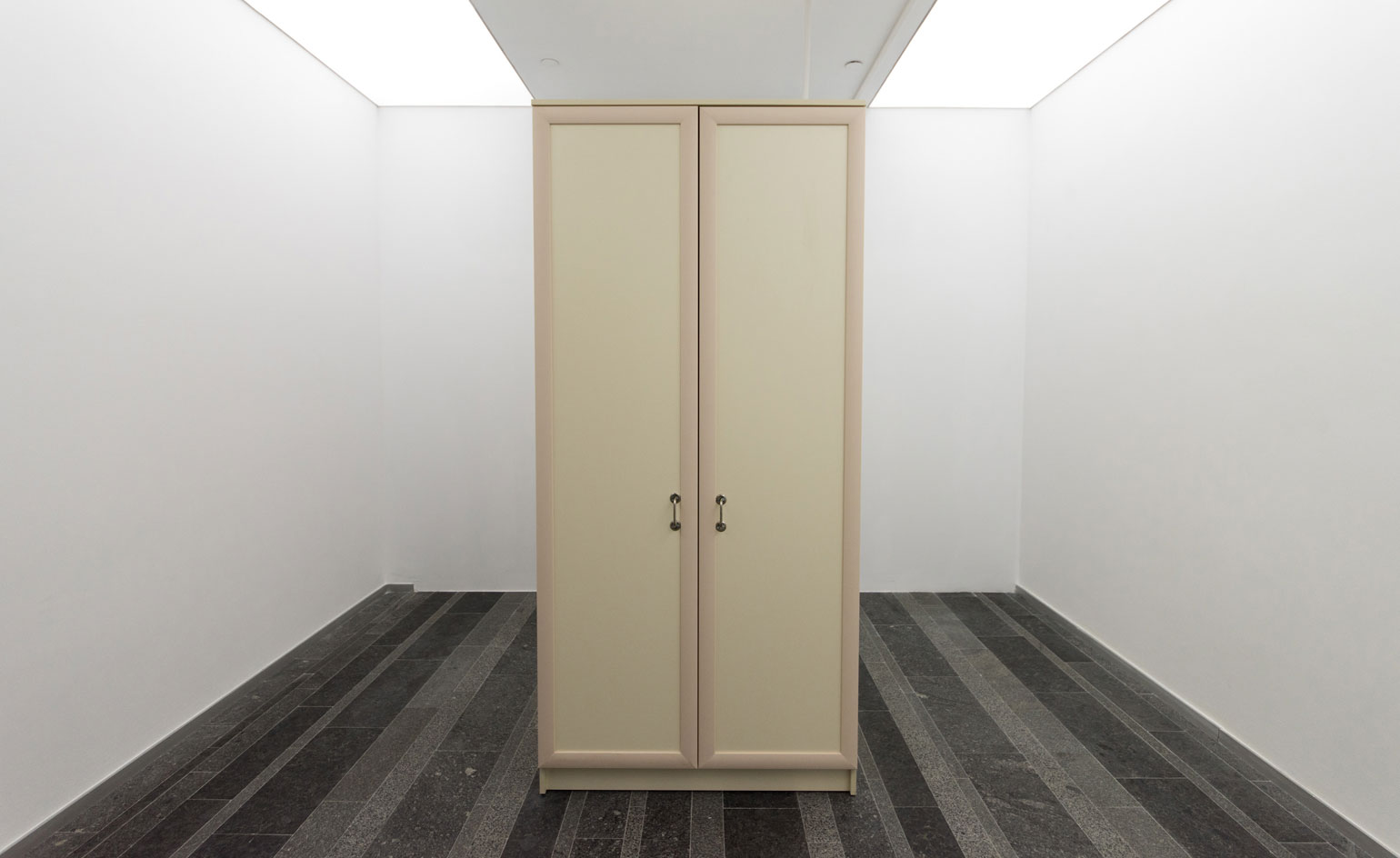
'Main squeeze (Vertical Cockpit)', by Jon Rafman, 2014
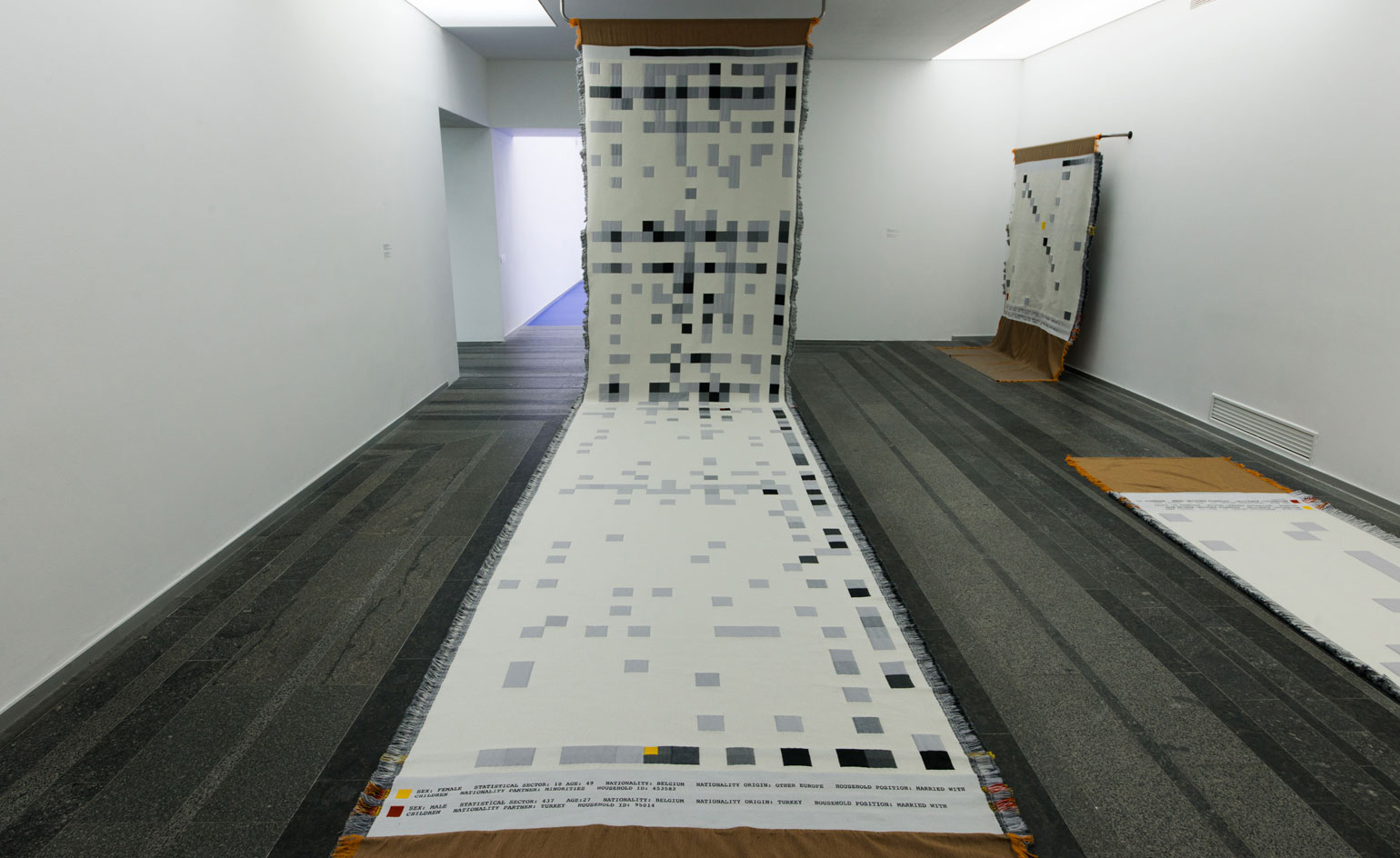
'Acquired Nationality', by Rossella Biscotti, 2014
ADDRESS
Pinchuk Art Centre
1/3-2, А Block
Velyka Vasylkivska/Baseyna Street
Kiev
Ukraine
Wallpaper* Newsletter
Receive our daily digest of inspiration, escapism and design stories from around the world direct to your inbox.
-
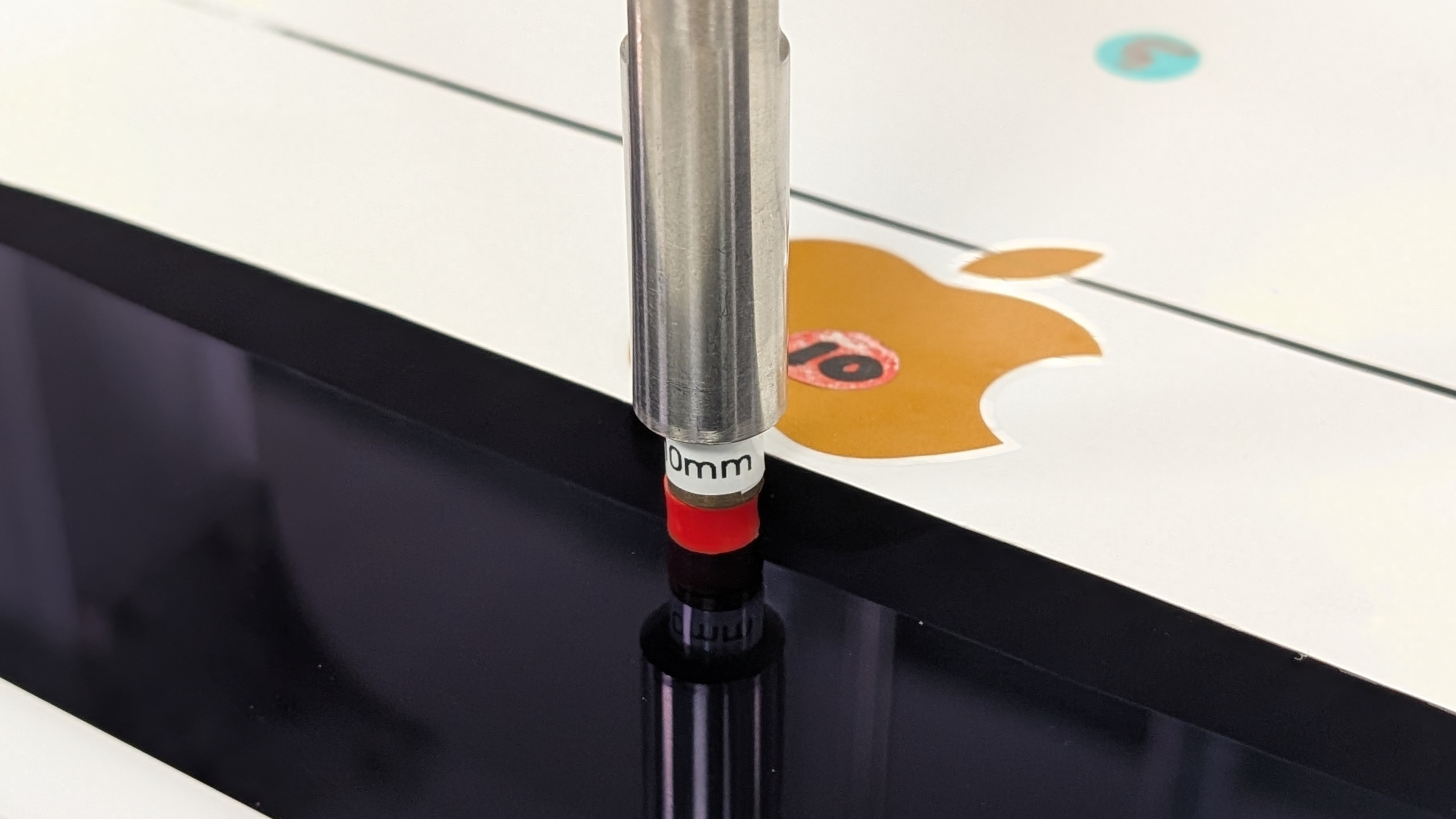 Under pressure: Apple applies skill, science and true grit to get the most out of its electronics
Under pressure: Apple applies skill, science and true grit to get the most out of its electronicsApple’s Cork HQ is home to a sophisticated R&D lab. Wallpaper* took a tour behind the scenes to see how longevity is baked in to new products
-
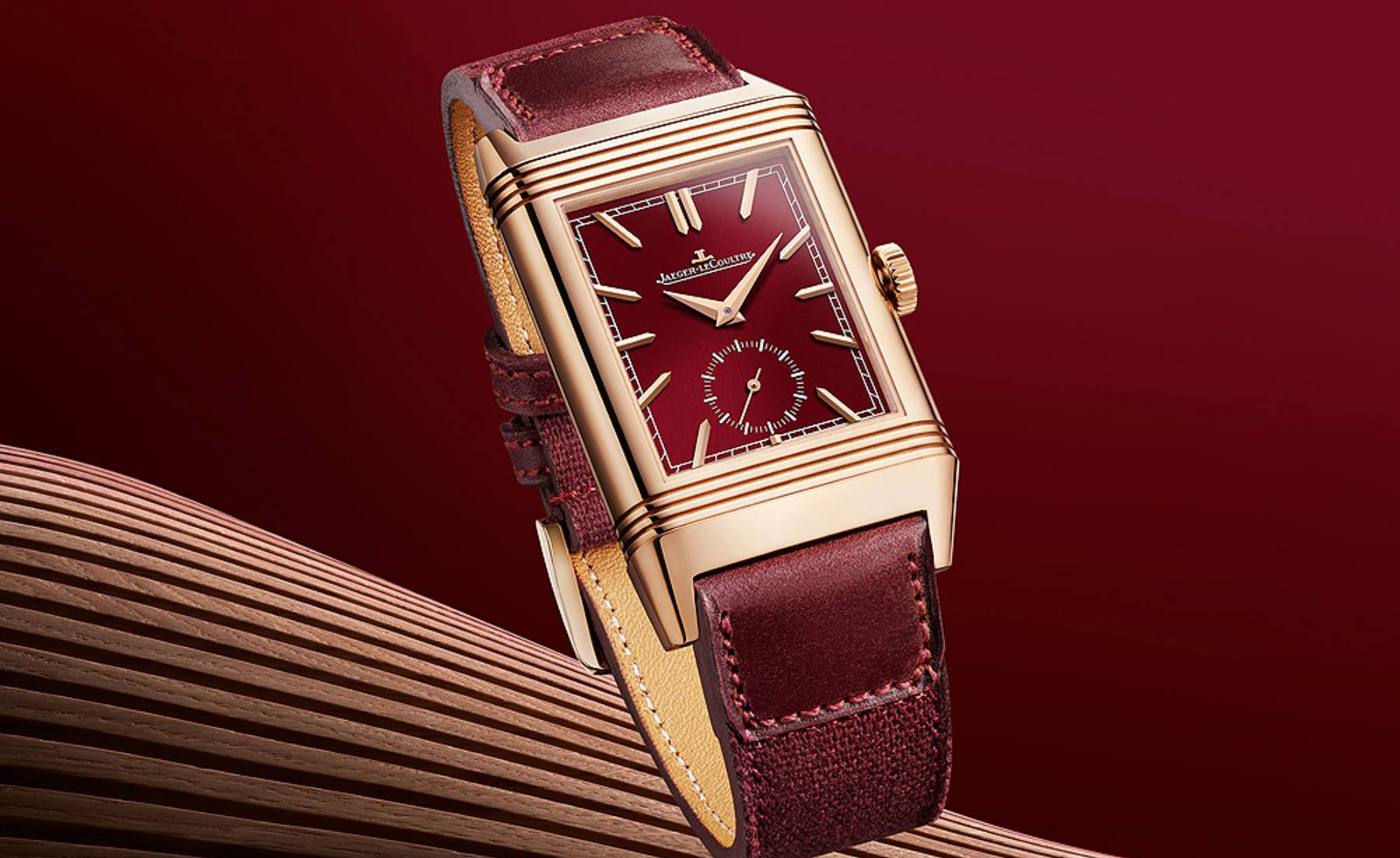 From dress to tool watches, discover chic red dials
From dress to tool watches, discover chic red dialsWatch brands from Cartier to Audemars Piguet are embracing a vibrant red dial. Here are the ones that have caught our eye.
-
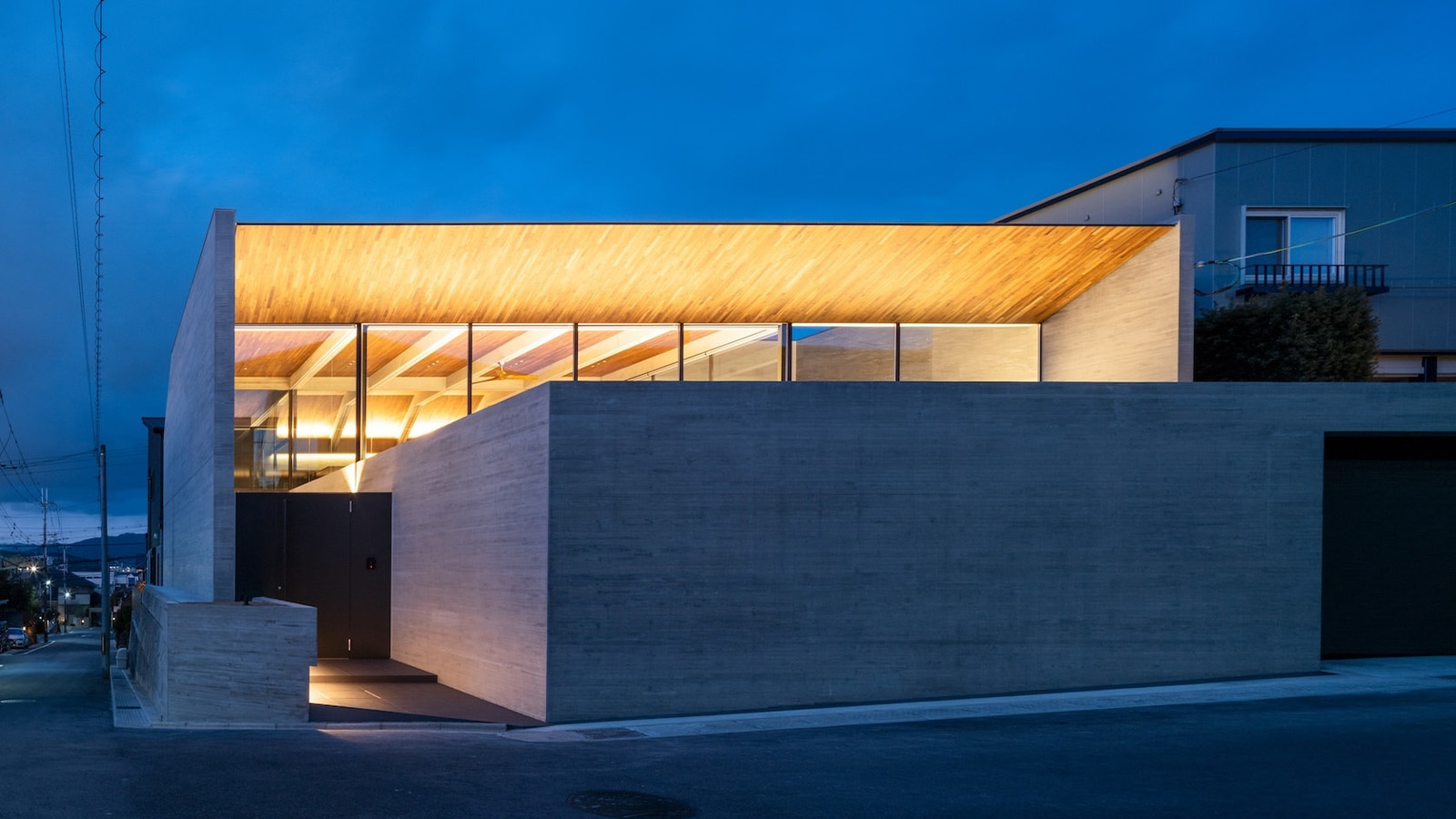 Behind a contemporary veil, this Kyoto house has tradition at its core
Behind a contemporary veil, this Kyoto house has tradition at its coreDesigned by Apollo Architects & Associates, a Kyoto house in Uji City is split into a series of courtyards, adding a sense of wellbeing to its residential environment
-
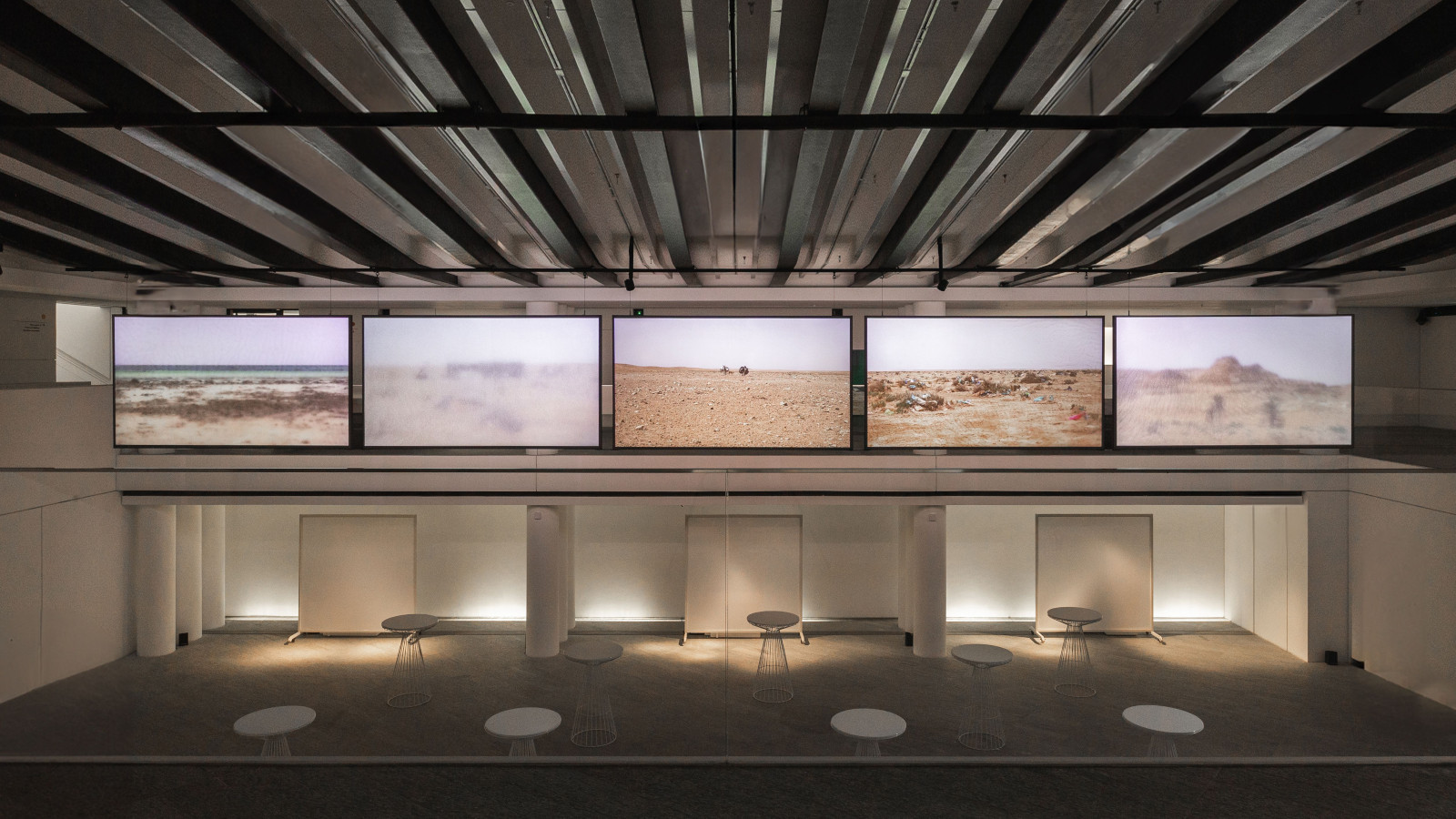 Nicène Kossentini’s disappearing desert landscapes win Richard Mille Art Prize 2024
Nicène Kossentini’s disappearing desert landscapes win Richard Mille Art Prize 2024Meet the Richard Mille Art Prize 2024 winner, and see all the shortlisted works, showcased by Louvre Abu Dhabi
-
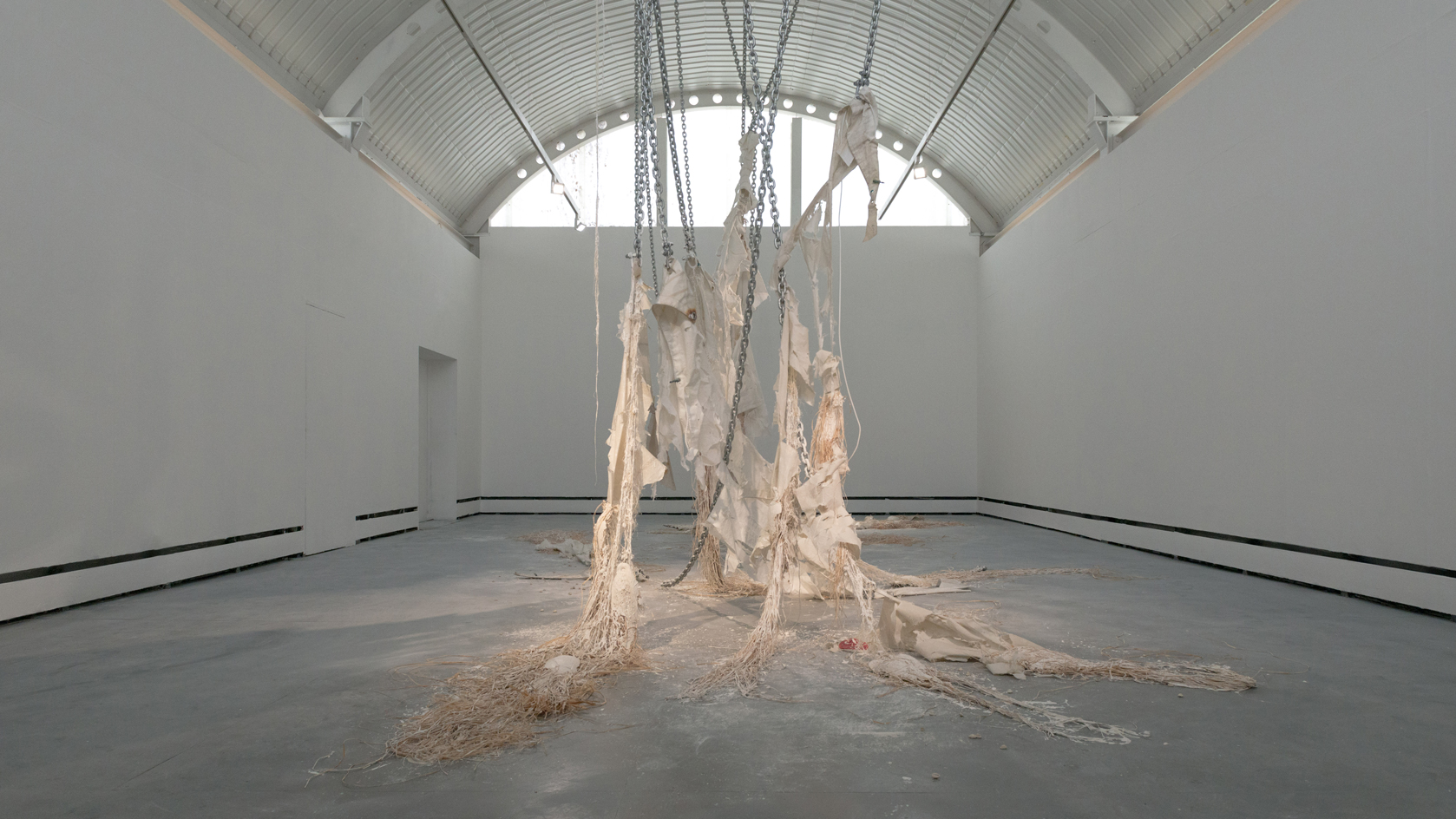 Dominique White wins Max Mara Art Prize for Women 2022 – 2024
Dominique White wins Max Mara Art Prize for Women 2022 – 2024Artist Dominique White has been crowned winner of the ninth edition of the Max Mara Art Prize for Women, presented in a ceremony at Whitechapel Gallery
-
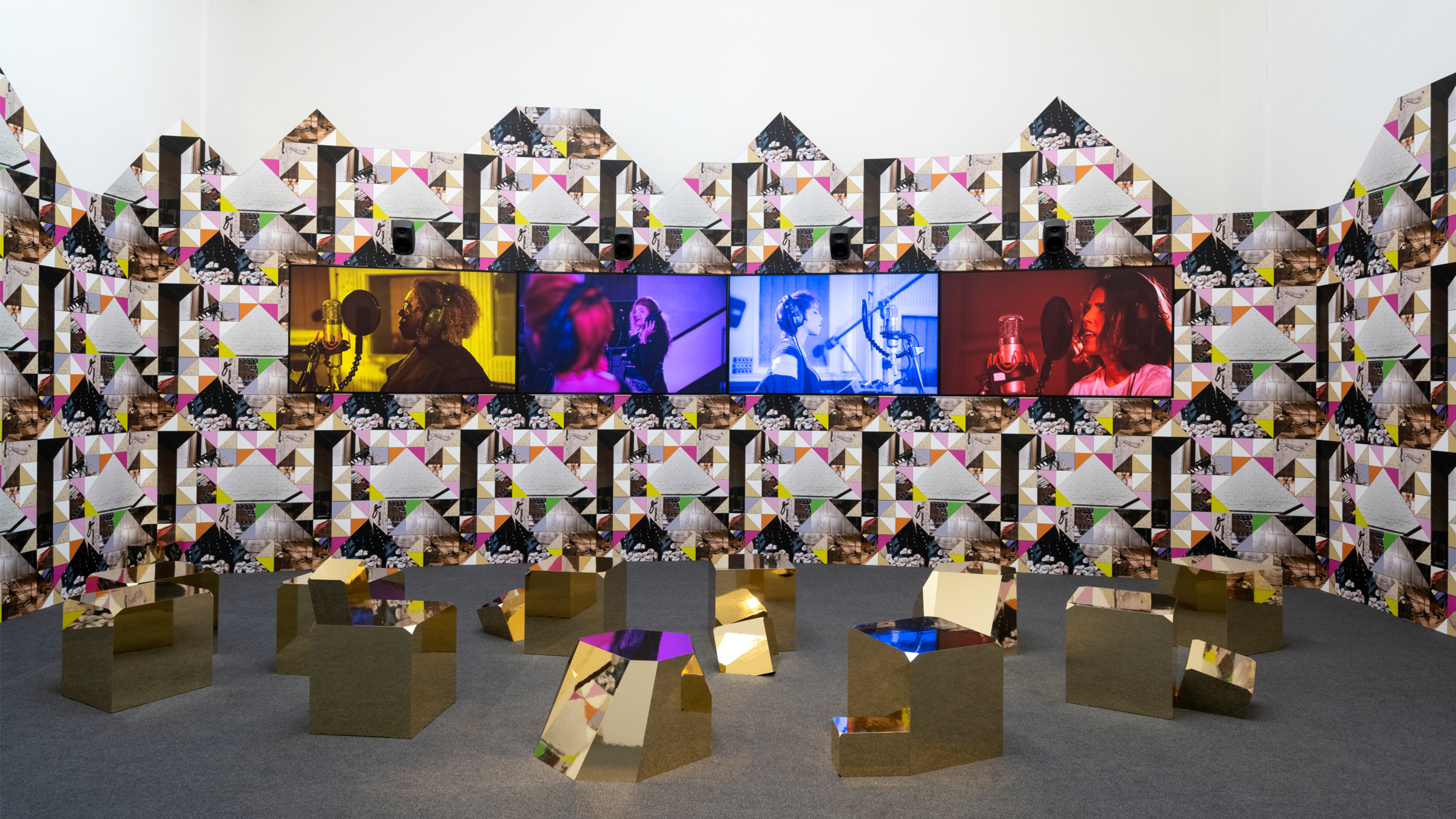 Sonia Boyce’s Golden Lion-winning Venice Biennale show opens UK debut in Margate
Sonia Boyce’s Golden Lion-winning Venice Biennale show opens UK debut in MargateIn February 2023, Turner Contemporary, Margate will host British artist Sonia Boyce’s 'Feeling Her Way', which won the Golden Lion for Best National Participation at the 2022 Venice Biennale
-
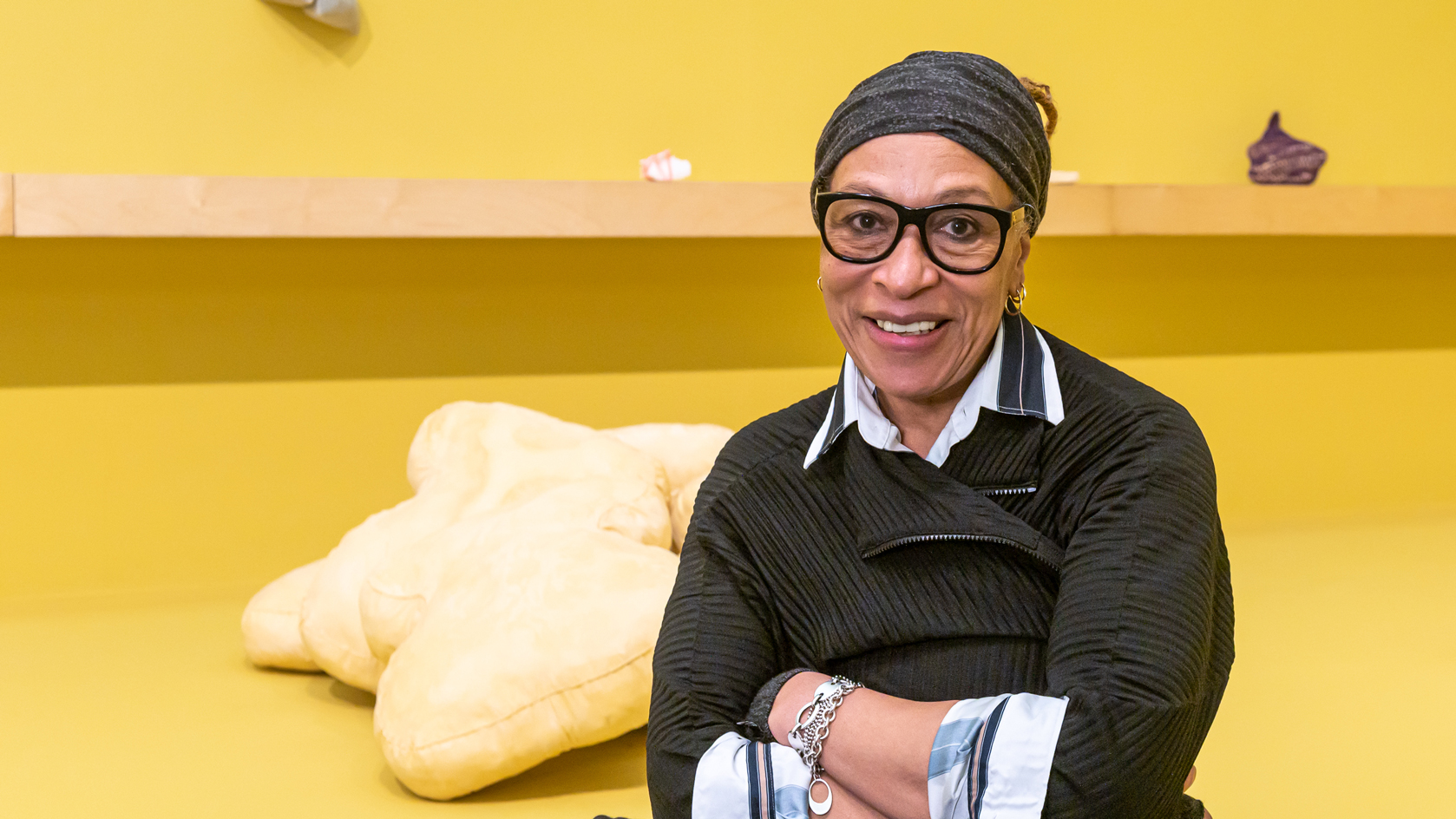 Veronica Ryan wins the 2022 Turner Prize
Veronica Ryan wins the 2022 Turner PrizeVeronica Ryan, the artist who honoured the Windrush generation, has been named winner of the 2022 Turner Prize in a ceremony held in Liverpool
-
 Turner Prize 2022 shortlist unveiled: meet the artists
Turner Prize 2022 shortlist unveiled: meet the artistsTate Liverpool today announced the four-strong shortlist for the Turner Prize 2022: Heather Phillipson, Ingrid Pollard, Veronica Ryan and Sin Wai Kin
-
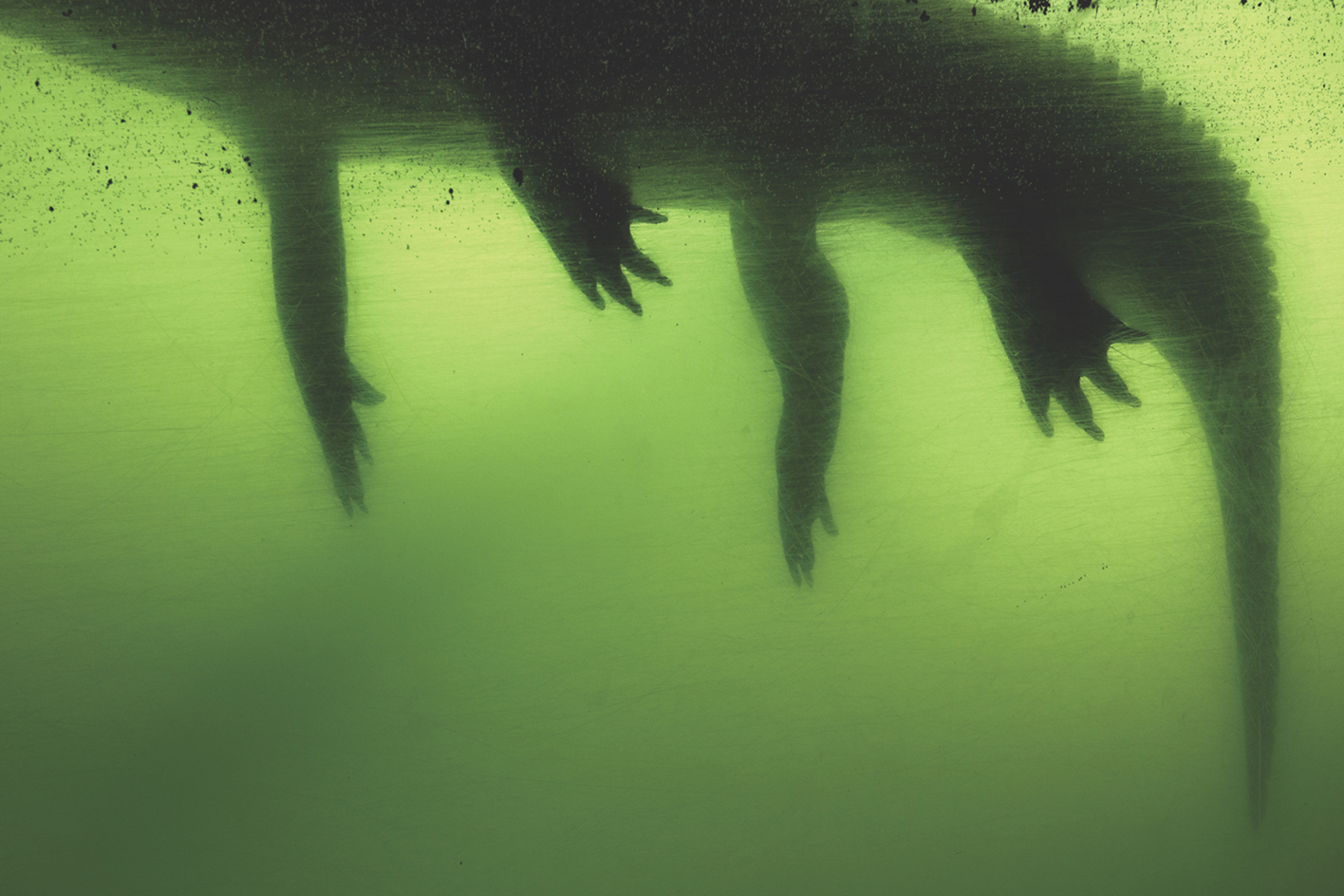 Deutsche Börse Photography Foundation Prize 2022: meet the nominees
Deutsche Börse Photography Foundation Prize 2022: meet the nomineesAs the Deutsche Börse Photography Foundation Prize exhibition opens in London, we take a closer look at the 2022 nominees: Anastasia Samoylova, Jo Ractliffe, Deana Lawson, and Gilles Peress
-
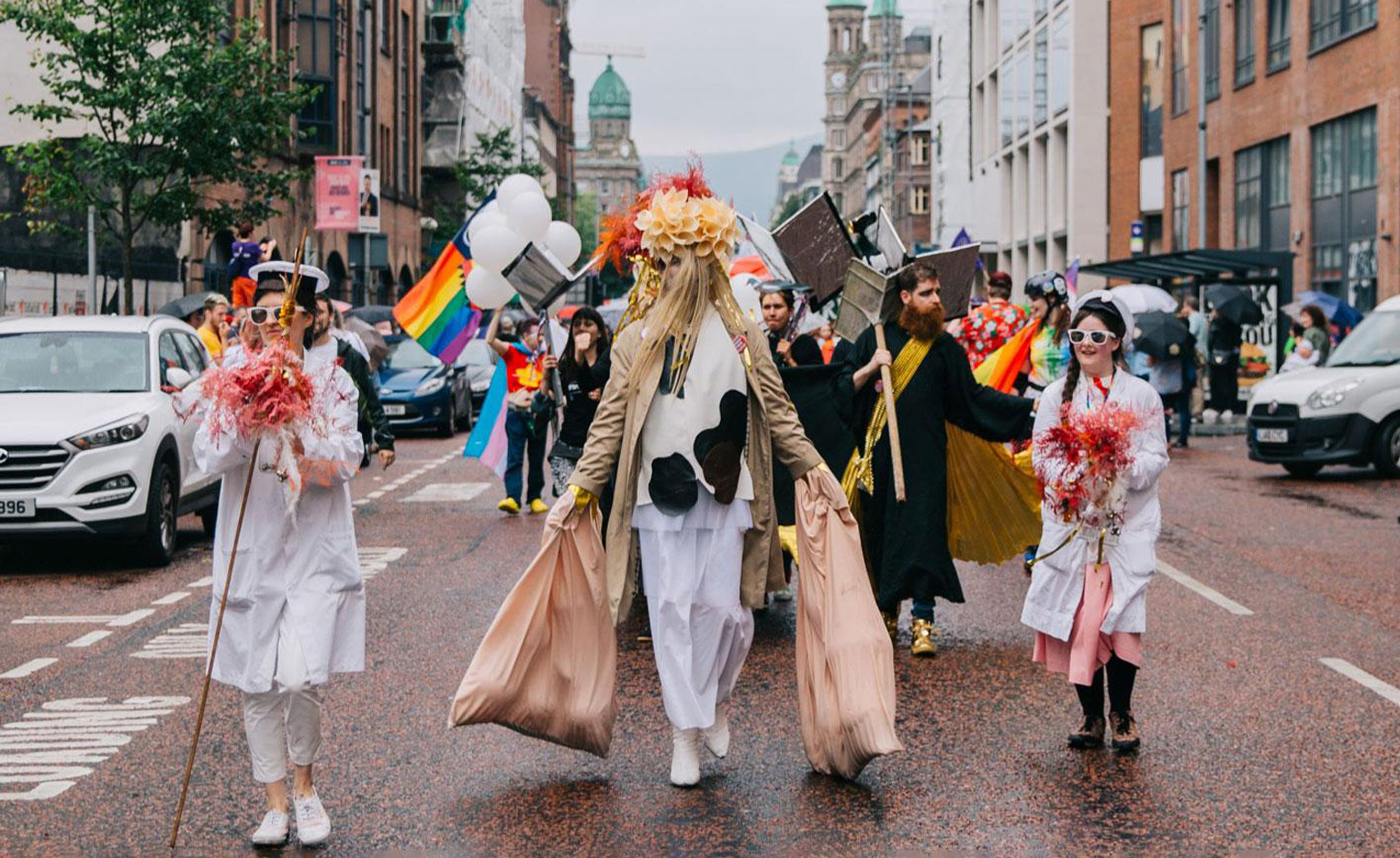 Array Collective wins the Turner Prize 2021
Array Collective wins the Turner Prize 2021Belfast-based Array Collective has been awarded the coveted Turner Prize 2021, chosen from a shortlist of five artist collectives
-
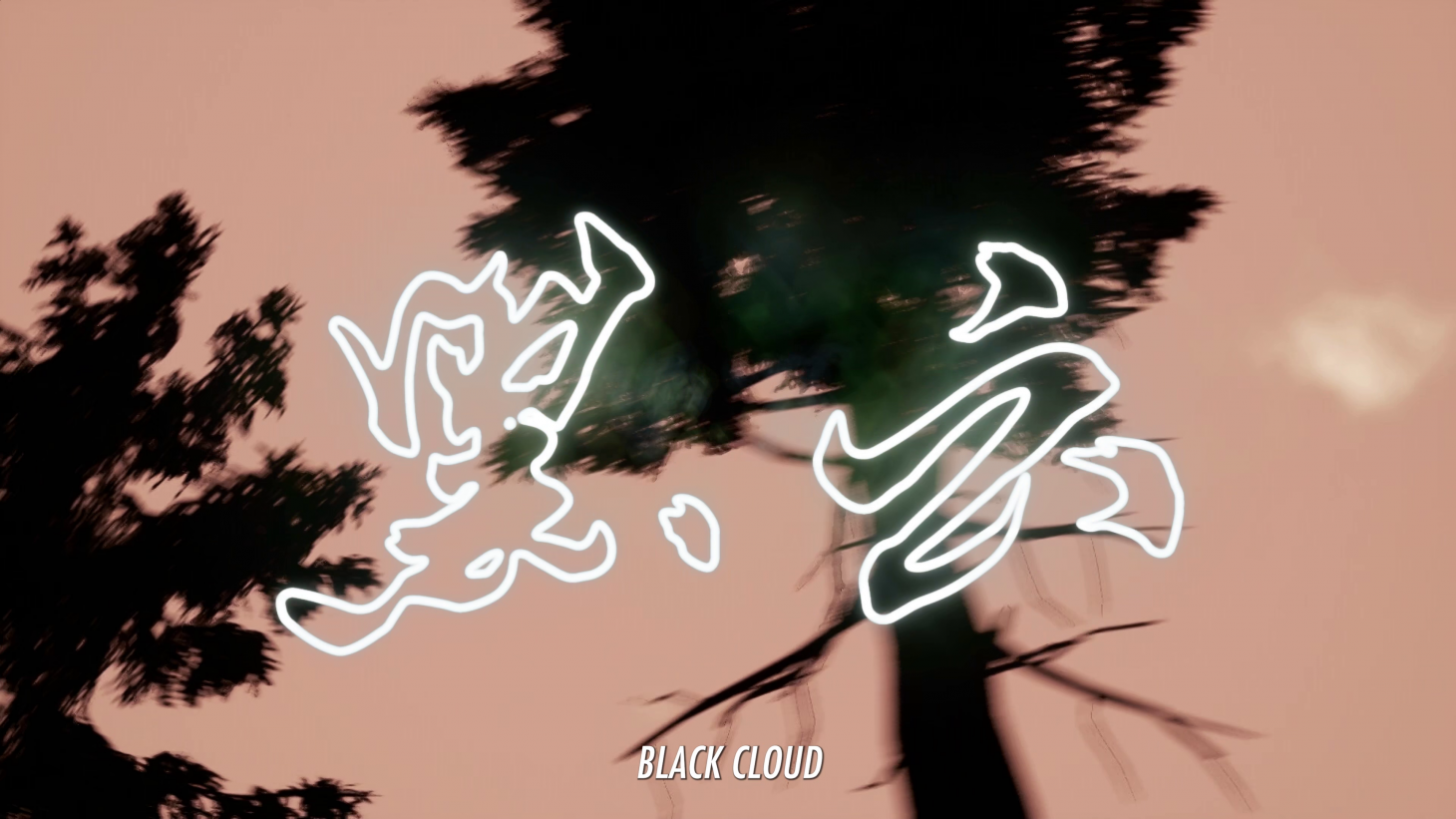 Hyundai names Lawrence Lek winner of VH Award for new media art
Hyundai names Lawrence Lek winner of VH Award for new media artLawrence Lek has been announced as the Grand Prix winner of the the 4th VH award, Asia’s leading prize for new media artists